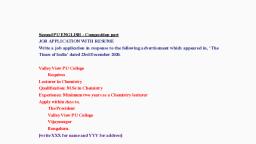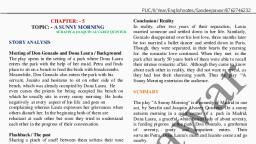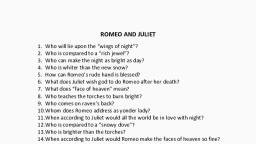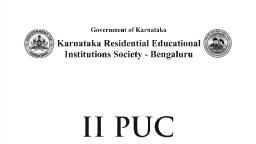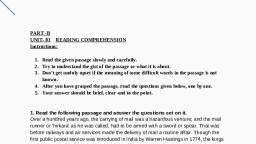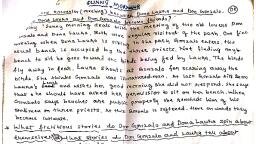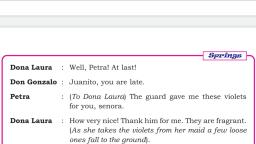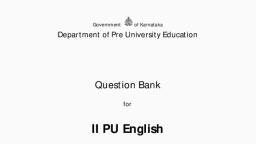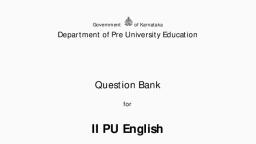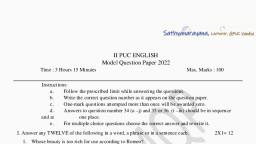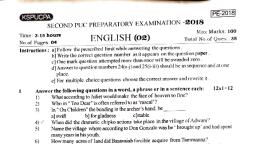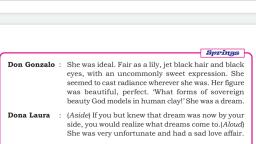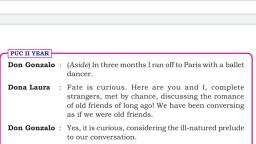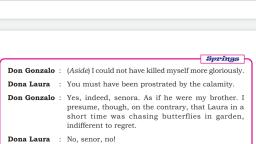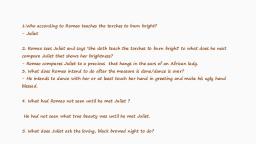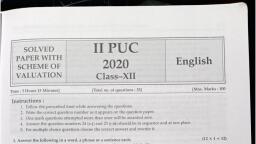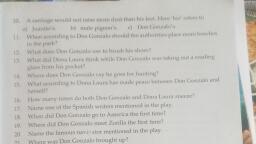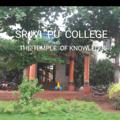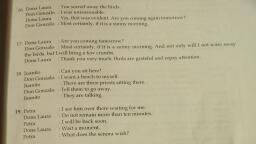Page 1 :
PART -B, UNIT- 01 READING COMPREHENSION, Instructions:, Read the given passage slowly and carefully., Try to understand the gist of the passage or what it is about., Don’t get unduly upset if the meaning of some difficult words in the passage is not known., After you have grasped the passage, read the questions given below, one by one., Your answer should be brief, clear and to the point., 1. Read the following passage and answer the questions set on it., Over a hundred years ago, the carrying of mail was a hazardous venture; and the mail runner or ‘hirkara’ as he was called, had to be armed with a sword or spear. That was before railways and air services made the delivery of mail a routine affair. Though the first public postal service was introduced in India by Warren Hastings in 1774, the kings and emperors of India had always maintained their own personal postal system. Their rule was effective partly due to excellent means of communication by which dispatches were passed on from hand to hand either by runners or horsemen. When Ibn Batuta was travelling in India, in the middle of the 14th century, he found an organised system of couriers established throughout the country by Mohammed Bin Tughlak., “There is a foot courier at a distance of every mile”, wrote Ibn Batuta, “and at every three miles there is an inhabited village, and outside it three sentry boxes, where the couriers sit. In the hands of each is a whip about two cubits long, and upon the head of this are small bells. Whenever one of the couriers leaves any city, he takes his dispatches in one hand and the whip, which he keeps constantly shaking, in the other. In this manner he proceeds to the nearest foot-courier and as he approaches, shakes his whip, upon this comes another man who takes the dispatches and proceeds to the next. It is for this reason that the Sultan receives his dispatches in such a short time.” This system was of course established for the convenience of the Emperor and was continued with various innovations by successive Mughal emperors in the 18th century. The East India Company established a postal system of its own to facilitate the conveyance of letters between different offices; but it was only during Warren Hastings’ administration that a PostMaster General was appointed and the general public could avail of the service, paying a fee on their letter., Answer the following in a word, a phrase or a sentence each., (a) What was the mail runner called?, (b) Who introduced the first postal service in India?, (e) Whom did the kings and emperors prefer to deliver their dispatches?, (d) When did Ibn Batuta travel in India?, (e) What did Mohammed Bin Tughlak establish?, (f) Where do the couriers sit?, (g) Which word in the passage means ‘new ideas or techniques’?, (h) As the courier approaches the nearest foot-courier near an inhabited village/city he, (i) shouts out loudly., (ii) shake the whip., (iii) whistles and sings., (i) Kings and emperors would successfully (communicate/communicate) with each other through couriers., (j) When was the PostMaster General appointed?, Answers:, (a) The mail runner was called ‘Hirkara., (b) Warren Hastings introduced the first postal service in India., (c) The kings and emperors preferred their dispatches to be passed on from hand to hand either by runners or horsemen., (d) Ibn Batuta travelled to India in the middle of the 14th century., (e) Mohammed Bin Tughlaq established an organised system of couriers., (f) The couriers sit in three sentry boxes outside every inhabited village., (g) Innovations., (h) – (ii) shakes the whip., (i) Communicate., (j) The PostMaster General was appointed during the administration of Warren Hastings., 2. Read the following passage and answer the questions set on it., A ten-year-old boy saw a flying bird and shot it down. He ran and picked it up. The bird looked like a house sparrow, but it had a yellow patch on the throat. The child had not seen such spots before. The puzzled boy took the sparrow to his uncle Amiruddeen and asked him what kind of bird it was. His uncle was not able to satisfy his curiosity. He took the boy to the office of Bombay Natural History Society and introduced him to W.S. Millard, the Honorary Secretary of the Society., Millard was surprised to find such a young boy keen to know about the bird. He took him around the room and showed him many stuffed birds. The child became more curious about birds., Thereafter, the boy started coming to his office frequently to learn about identifying and preserving birds. The boy was Salim Moizuddin Abdul Ali, later known as Salim Ali, the bird watcher. Salim Ali was born on November 12,1896. He did a course in Zoology and was appointed a guide at the museum of Bombay Natural History Society. During the course of this work he became more and more eager to study the living conditions of the birds. With this aim he went to Germany. After one year, he returned to India. In his absence, his post in the museum had been abolished for lack of funds. He would sit under the trees throughout the day and write in his note book about the activities of the weaver bird. In 1930 he published a research paper on the nature and the activities of the weaver bird. The published papers brought him fame and recognition in the fields of Ornithology. After this, he travelled to various places to study about birds and wrote a book titled ‘The Book of Indian Birds’ which was published in 1941. The book gave information about 538 species of Indian birds. Because of his deep knowledge about birds, people started calling him the moving encyclopaedia of birds. He worked not only in the study of birds but also in the field of protection of nature. He was given an International award of Rs. 5,00,000 which he donated to the Bombay Natural History Society. In 1983, he was awarded the Padma Vibhushan by the Government of India., When this ninety-year-old ornithologist died on 20 June 1987, the birds lost their godfather and friend., Answer the following in a word, a phrase or a sentence each., (a) Which bird had the boy shot down?, (b) What difference did the boy see about the bird?, (c) Name the boy’s uncle., (d) Who was W.S. Millard?, (e) Where was Salim appointed as a guide?, (f) How long had Salim been in Germany?, (g) Salim was famous for his role in the (protecting/protection) of nature., (h) Mention the title of the book written by Salim., (i) Pick out and write the word which means ‘Study of Birds’ in the passage., (j) Which award was conferred on Salim Ali by the Government of India?, Answers:, (a) The boy had shot down a flying bird with a yellow patch on the throat which looked like a house sparrow., (b) The bird had a yellow patch on the throat., (c) Amiruddeen., (d) W. S. Millard was the Honorary Secretary of the Bombay Natural History Society., (e) Salim was appointed as guide at the museum of Bombay Natural History Society., (f) Salim had been to Germany for one year., (g) Protection., (h) The Book of Indian Birds., (i) Ornithology., (j) Padma Vibhushan was conferred on Salim Ali by the Government of India., 3. Read the following passage and answer the questions set on it., A remarkable story of personal survival ever published was that of an American Corps pilot named Lieutenant Colonel William Rankin. It was on 26th July, 1959, that colonel Rankin was flying at an altitude of 47,000 feet over South Carolina, when the red fire-warning light flashed on in the cockpit of his crusader jet fighter plane. At the same time he felt jerking and shaking. After communicating with a companion aircraft on his radio, Colonel Rankin decided to make an emergency exit from his falling plane by using the ejection seat.It is all the more of interest and essential to point out that up to that moment, nobody had ever ejected from a plane flying at 500 miles per hour and at such an altitude. Outside the protection of his pressurised cockpit, the pilot had to face an air temperature of 70 degrees below zero, and a low atmospheric pressure which was liable to make his blood boil especially when he was wearing only flying suit, helmet, gloves and ordinary footwear. His parachute was designed to open automatically at 10,000 feet but as he glanced below, the colonel saw to his horror that he was falling straight into the centre of a huge, black thunder cloud. Powerless to do anything he gritted his teeth and awaited the sudden jerk of his opening parachute. As it's reassuring canopy blossomed out above him, he felt another tremendous blast as the terrible forces of wind and hail inside the thunder cloud battered his body., Instead of descending at a normal rate of about 1,000 feet per minute, a powerful up current of air sent him up, until he was floating on the clouds which enclosed him from all directions. Suddenly there was thunder and lightning. The next instant, he would again be flying upwards until his shoulders ached with the drag. Every second he feared his parachute would tear into pieces. After tearing winds and crashing sounds, the Colonel gradually felt the turbulence lessening. Then, at last he caught a glimpse of a green field below him. He had finally emerged from the giant thunder cloud which had held him prisoner for over half an hour. In fact, his descent, which would normally have lasted ten minutes, had taken forty minutes., Answer the following in a word, a phrase or a sentence each., (a) When did the incident mentioned in the passage take place?, (b) Where was Colonel Rankin flying over at the time of the accident?, (c) What warned Rankin about the calamity?, (d) Mention any one of the problems faced by him when he ejected out of the cockpit., (e) Where did the colonel land straight into?, (f) What battered his body inside the thunder cloud?, (g) Add a suffix to the word ‘power’ to make its antonym., (h) He caught a glimpse of the green field below. Here the word ‘glimpse’ means, (i) caught sight of (ii) couldn’t see anything (iii) saw far of fire., (i) How long was Rankin enclosed in the thunder cloud?, (j) The Colonel ‘gritted his teeth’. The idiomatic expression means, (i) to be afraid (ii) to be cold (iii) to be angry., Answers:, (a) The incident mentioned in the passage took place on 26 July 1959., (b) At the time of the accident, Colonel Rankin was flying at an altitude of 47,000 feet over South Carolina., (c) The red fire-warning light flashed in the cockpit of Colonel Rankin’s crusader jet fighter plane which warned him about the calamity., (d) When the pilot ejected out of the protection of his pressurised cockpit, he had to face an air temperature of 70 degrees below zero, and a low atmospheric pressure which was liable to make his blood boil especially when he was wearing only flying suit, helmet, gloves and ordinary footwear., (e) The colonel landed straight into the centre of a huge, black thunder cloud., (f) The terrible forces of wind and hail inside the thunder cloud battered the colonel’s body., (g) Powerless., (h) – (i) caught sight of., (i) Colonel Rankin was enclosed in the thunder cloud for over half an hour., (j) – (ii) to be cold., 4. Read the following passage and answer the questions set on it., George Bernard Shaw, one of the greatest playwrights of all time, was born in Dublin on 26th July, 1856. As a young man he was terribly shy and to hide his shyness he developed a very gruff manner and voice which some people mistook as rudeness. However, his close friends understood him better as he was the very essence of kindness to those whom he loved and associated with. At the early age of fourteen, he obtained employment as a junior clerk and though he was quite good at his work, he hated it. So he quit his job and went to London in search of other employment. Before long a newspaper office hired him and he took up employment as critic of books, music and plays. His duty was to attend the various plays staged and give his opinion on them for publication. It was then that he decided to write his own plays. The plays he wrote and produced were a tremendous success. In no time he became world famous as a playwright. Many film companies approached him to use his plays for making movies, but he never liked the idea and turned them down. Finally, he consented to allow his play ‘Pygmalion’ to be made into a film. This play depicts the story of a little flower girl, T chen'-Dy an Lng hsn professor who speaks proper English. In fact, the professor succeeded in transforming her from an uneducated flower girl into a refined lady. Years later, this play was made into a musical hit – the legendary, ‘My Fair Lady’. And it became a worldwide success. Shaw used the huge money earned from this, to worthy causes, such as the enlargement of National Gallery of Ireland, the Royal Academy of Dramatic Art and the British museum. The film ‘My Fair Lady’ is about how complicated the English language is and the difficulties faced by Eliza, the flower girl, to learn and master this language. He lived long enough to see people all over the world enjoy his plays. He died at the ripe old age of ninety-four., Answer the following in a word, a phrase or a sentence each., (a) How did Bernard Shaw try to hide his shyness?, (b) How old was Bernard Shaw when he took up his first job?, (c) Where did Bernard Shaw go after quitting his job?, (d) Which of his plays was made into a film first?, (e) Name the little flower girl who appears in the musical hit ‘My Fair Lady’., (f) Add a suitable prefix to the word ‘educated’ to form its antonym., (g) Mention any one of the causes to which Shaw contributed the money earned by him., (h) Who trained the flower girl to become a refined lady?, (i) How old was Shaw when he died?, (j) The English language is full of (complication/complications)., Answers:, (a) To hide his shyness, Bernard Shaw developed a very gruff manner and voice which some people mistook for rudeness., (b) Bernard Shaw was fourteen years old when he took up his first job., (c) Bernard Shaw went to London after quitting his job., (d) ‘Pygmalion’ was the first of his plays to be made into a film., (e) Eliza., (f) Uneducated., (g) Enlargement of the National Gallery of Ireland., (h) An English professor trained the flower girl to become a refined lady., (i) Shaw was ninety-four years old when he died., (j) Complications., 5. Read the following passage and answer the questions set on it., If you visit the three pyramids of Giza, you will be surprised to see a colossal statue of a beast with a man’s head and a lion’s body. This is the great Sphinx that sits in the desert of Egypt, about 12 kms from Cairo. The statue has mysterious eyes and an enigmatic expression. It gazes over the desert with a kind of mystical superiority. It is one of the most historical monuments in the world. The Sphinx was carved out of the hill rock leftover from the building of the Great Pyramid. It is about 20 m in height and 70 m in length. According to popular belief, it was made some 5000 years ago to resemble the face of Chephren, a king of the fourth dynasty. It was built during the reign of the Egyptian king Khafre., Why was the Sphinx built? The Sphinx was a mythical monster. The Greeks thought of it as having the head of a woman, and body of a lion with wings. The Egyptians thought of ft as a wingless lion with the head and breast of a man. It was believed that the Sphinx would ward off all evils from the cemetery around the pyramids., Apart from the great Sphinx of Giza, there are many other Sphinxes in Egypt. Their heads represent different kings. In ancient Egypt, kings were considered to be descendants of the Sun God called Rio. When a king died, he himself was supposed to become the Sun God. Kings were also believed to have the strength of various beasts. So the Egyptians sculpted their Gods and kings in the shape of half human and half beast. There is another Sphinx with a female face. It is made after the queen of Hatshepsut, who had seized the throne and ruled the country. This Sphinx has a beard which represents queen Hatshepsut’s masculine powers., Answer the following in a word, a phrase or a sentence each., (a) Where can one come across the Sphinx?, (b) What expression is seen on the face of Sphinx of Giza?, (c) Which leftover rock was used to carve the Sphinx?, (d) Whose face does the Sphinx of Giza resemble?, (e) Name the Sun God of Egypt mentioned in the passage., (f) Add a suitable prefix to the word ‘Popular’ to make its antonym., (g) Whose face does the Sphinx with a female face resemble?, (h) The Egyptians (believe/belief) that Sphinxes have mystical powers., (i) Why is there a beard on the face of the female Sphinx?, (j) In what form were the Gods and kings in Egypt sculptured?, Answers:, (a) One can come across the Sphinx in the desert of Egypt, about 12 kms. from Cairo., (b) An enigmatic expression is seen on the face of the Sphinx of Giza., (c) The Sphinx was carved out of the hill rock leftover from the building of the Great Pyramid., (d) The Sphinx of Giza resembles the face of Chephren, a king of the fourth dynasty., (e) Rio., (f) Unpopular., (g) The Sphinx with the female face resembles the queen of Hatshepsut., (h) Believe., (i) The female Sphinx has a beard which represents queen Hatphepsut’s masculine powers., (j) The Egyptians sculpted their Gods and kings in the shape of half-human and half-beast., 6. Read the following passage and answer the questions set on it., Confucius was one of the greatest moral teachers and philosophers of China. He studied ancient Chinese writings with great devotion. These works taught him new ideas about character development. His actual name was ‘Kung fu-tzu’, the Catholic missionaries called him Confucius., Confucius was born in the state of Lu, now part of Shandong in China. His family belonged to the lowest level of aristocracy. His parents died when he was still young and he grew up in poverty. Later, he became an official in the government of Lu, and was much respected. China, during those days, was ruled by an emperor with very little powers. The provinces were controlled by corrupt and greedy feudal lords. The people were poor and neglected. Confucius felt disgusted at this state of affairs and left Lu in 484 BC. He started preaching whatever he had learnt from the ancient Chinese writings. Human behaviour, morality and politics were the main elements of his teaching. At the age of twenty-two he started teaching how to lead a happy life. He said, ‘Don’t do to others what you would not wish them to do to you’. He taught, ‘Thou shalt love thy neighbour as thyself’. He was very modest and always said, ‘1 teach nothing new. I only pass on the ancient wisdom’. On returning to Lu, he also held some important positions in the local government of his province. When he was made the Governor of a city, he cleared the state of robbers, reduced taxes, improved people’s living conditions and persuaded the ruling classes to lead charitable lives. According to one account, he was also made a minister. He tried his best to improve the evils ingrained in all branches of social life. But soon he realized that they were deep-rooted. So he resigned in disgust at the age of 54. Confucius’ own sayings were collected by his disciples and written down much later, in the book ‘Lun Yu’. Confucius died in 479 BC. The religion founded by him is known as Confucianism. It includes ancestor worship, belief in supreme God and belief in Nature Spirit. Even today it influences millions of lives., Answer the following in a word, a phrase or a sentence each., (a) Which country did Confucius come from?, (b) Who named him Confucius?, (c) For which government did he work as official?, (d) By whom were the provinces in China controlled?, (e) What did he do after leaving Lu?, (f) Mention any one of the elements of his teaching., (g) How old was he when he started teaching?, (h) Add a prefix to the word ‘morality’ to form its antonym., (i) Confucius was very (wise/wisdom) in his thinking., (j) Name the book written by his disciples about the sayings of Confucius., Answers:, (a) Confucius came from the state of Lu, now part of Shandong in China., (b) The Catholic missionaries called him Confucius., (c) Confucius worked as an official in the government of Lu., (d) The provinces in China were controlled by corrupt and greedy feudal lords., (e) Confucius started preaching whatever he had learnt from the ancient Chinese writings after leaving Lu., (f) Human behaviour., (g) Confucius started teaching at the age of twenty-two., (h) Immorality., (i) Wise., (j) ‘Lun Yu’, UNIT-02 POETRY COMPHRENSION, Q.NO 25. Read the following lines and answer the question set on it: 3x1=3, Two roads diverged in a yellow wood, And sorry I could not travel both, And be one traveler, long I stood, And looked down one as far as I could, To where it bent in the undergrowth., Where do the two roads diverge?, In a yellow wood, The word ‘both’ in the second line refers to., a. Traveler b. Woods c. Roads., c. road, What did the traveler do when he came across the two diverged roads?, He/ She stood for a long time/ looked down one road as far as he/ she could., 2. Seven years I could not walk a step, When I to the great physician came, He demanded; why the crutches?, And I told him; I am lame, How long could the speaker not walk a step?, Seven years, Who does ‘He’ in the third line refer to?, ‘He’ refers to the physician, Why does the speaker use the crutches?, Because he/ she is lame., 3. O Blithe new-comer! I have heard., I hear thee and rejoice., O Cuckoo! Shall I call thee bird?, Or but a wandering voice., Who is the new-comer addressed by the speaker?, The cuckoo, How does the speaker feel on hearing the song?, Rejoices / feel extremely happy, What is the other phrase the speaker uses to refer to the bird?, A wandering voice., 3. Lord, I am so tired, Tired I entered this world, Far have I wandered since the cock crew?, And the road to school is steep, Lord, I do not want to go into their school., Who is addressed by the speaker?, Lord/ God/ Almighty, What time of the day does ‘since the cock crew’ suggest?, Dawn / early morning / daybreak, How is the road to school according to the speaker?, Steep, 4. At the corner of wood street, when daylight appears, Hangs a thrush that sings loud, it has sung for three years., Poor Susan has passed by the spot, and has heard, In the silence of the morning the song of the bird., Where does Susan come across the thrush?, At the corner of wood street, How long has the thrush been singing?, Three years, When has Susan heard the song of the bird?, In the silence of the morning., 5. A little fairy comes at night, Her eyes are blue, her hair is brown, With silver spots upon her wings., And from noon she flutters down., When does a little fairy come?, At night, What is the color of eyes?, blue, Where does she flutter down from?, The noon, 6. I met a traveler from an antique land, Who said; two vast and trunk less legs of stone, Stand in the desert, near them on the sand, Half sunk, a shattered visage lies, whose frown, Where had the traveler come from?, From antique land, What did he see standing in the desert?, Two vast and trunk less legs of stone, What was the expression on the shattered visage?, Frown., 7. Child, how happy you are sitting in the dust., Playing with a broken twig all morning., I am busy with my account., Where is the child sitting?, In the dust, The child is playing with…., A broken twigs, What is the speaker doing?, Busy with his account., 8. A free bird leaps, On the back of the wind, And floats downstream, Till the current ends, And dips his wings, In the orange sun rays., Who leaps on the back of the wind?, A free bird, How long does the bird float?, Till the current ends, The bird dips his wing in________., Orange sun rays, Blue sky, Dark cloud, Ans: orange sun rays., 9. The friendly cow all red and white, I love with my heart, She gives me cream with all her might, To eat with apple tart, What is the colour of the cow?, All red and white., What does the cow give?, Cream., What is the cream eaten with?, With apple tart., 10.Fishermen at whatever point they are dipping and lifting, On the dark green swell they partly think of as home, Hear the gale warnings that fly to them like gulls, What are the fishermen doing?, They are dipping and lifting., Where are they working?, On the dark green., How do the gale warnings fly?, Like gulls., 11. The caged bird sings with a fearful trill, Of things unknown but longed for still, And his tune is heard on the distant hill, For the caged bird sings of freedom., How did the caged bird sing?, Fearfully, Where was its tune heard?, On the distant hill, What song did the bird sing?, Song of freedom, Unit - 03, ACTIVE VOICE AND PASSIVE VOICE, Simple Present tense:, It is used to express an action that is actually taking place at the present moment., Subject +Verb+ Object +., I eat mango., He eats a mango., She eats a mango., You eat a mango., We eat mangoes., They eat the mangoes., It eats mangoes., Simple past tense:, It is used to express an action that took place in the past tense., Subject + Verb + Object + ., I ate a mango., He ate a mango., She ate a mango, You are a mango., We are the mangoes., They ate the mangoes., It ate the mangoes., Simple future tense:, It is used to express some future action., Subject + will + verb + object + ., I will eat a mango., He will eat a mango., She will eat a mango., You will eat a mango., We will eat the mangoes., They will eat the mangoes.., It will eat a mango., Present continuous tense., It is used to express an action that is going on at the time of speaking., Subject+ am/is/are + verb + ing + object +., I am eating a mango., He is eating a mango., She is eating a mango., You are eating a mango., We are eating mangoes., They are eating the mangoes., It is eating a mango., Past continuous tense:, It is used to express an action that began in the past and continues in the past., Subject + was/were + verb + ing + object+ ., I was eating a mango., He was eating a mango., She was eating a mango., You were eating a mango., We were eating mangoes., They were eating the mangoes., It was eating a mango., Future continuous tense, It is used to express an action that is going on at some point of time in future., Subject + wii + be + verb + ing + object + ., I will be eating a mango., He will be eating a mango., She will be eating a mango., You will be eating a mango., We will be eating mangoes., They will be eating mangoes., It will be eating a mango., Present perfect tense., It is used to express an action begun in the past and completed at the present ( just)., Subject + has/have + v3 + object+ ., I have eaten a mango., He has eaten a mango., She has eaten a mango., You have eaten a mango., We have eaten mangoes., They have eaten the mangoes., It has eaten a mango., Past perfect tense., It is used to express an action completed at some point in past time before another action was begun., Subject + had + v3+ object + ., I had eaten a mango., He had eaten a mango., She had eaten a mango., You had eaten a mango., We had eaten mangoes., They had eaten a mango., It had eaten a mango., Future perfect tense., It is used to express an action completed at some point in past time before another action was begun., Subject + have + V3+ + object + ., I will have eaten a mango., He will have eaten a mango., She will have eaten a mango., You will have eaten a mango., We will have eaten a mango, They will have eaten a mango., It will have eaten a mango., Present perfect continuous tense, It is used to express actions which began in the past and still are going on., Subject + has/have + been +ing + __., I have been working as an English teacher for 30 years., He has been learning English since 2012., She has been singing the songs for 20 years., You have been playing cricket for 5 years., We have been writing poems since 2015., They have been playing chess for 30 years., It has been drinking water since birth., 2. Past perfect continuous tense:, It is used to express an action which was completed at a definite past time, but which had been going on till then., Subject + had +been + ing____., I had been working as an English teacher., He had been learning English., She had been singing the songs., You had been playing chess., We had been writing poems., They had been playing chess., It had been drinking milk., 3. Future perfect continuous tense, It is used to express an actions that will continue up until a past in future, The activity will have begun sometime in the past, present, or in the future, and is expected to continue in the future., Subject + will + have + been + ing__., In November, I will have been working at my company for three years., At five o’clock, he will have been waiting for thirty minutes., When I turn thirty, she will have been playing piano for twenty-one years., You will have been waiting here for three hours by six o'clock., By 2022 we will have been living in London for sixteen years., When I finish this course, they will have been learning English for twenty years., Next year it will have been working here for four years., NO. 26. Complete the following by filling the blank using the right form of the verb given in brackets: 3x1=3, 1. The contemporary seeds _______ (sow) when the living earth ____________ (transform) into dead matter to facilitate the industrial revolution. Monocultures ____________ (replace) by biodiversity., 2. A person exactly like him __________ (need) by the owner of the plantation. A few words ____________ (exchange). The old man __________ (appoint) by the owner., 3. The general _________ (call). He _________ (ask) to find a soldier who would cut the man's head off. The general talked it over with soldiers. But the soldiers said, that it was not a thing they _______ (teach), 4. The guard ________ (dismiss). It _________ (decide) to offer the criminal a pension. The pension fixed was 600 francs. This_________ (announce) to the prisoner., 5. A contract to cut trees_________ (obtain) by Bachni Devi's husband. But he _________ (oppose) by his own wife. When the officials arrived at the forest lighted lanterns _________ (hold) up by women although it was broad daylight., 6. Navdanya farm_________ (start) by Vandana Shiva in 1994 in the Doon valley. Today, 630 varieties of rice and 150 varieties of wheat_________ (grow) are conserved. A bio-diversity intensive form of farming_________ (practice) even today., 7. The war against Earth began with the idea of separation. Its seeds_________ (sow) when the living earth_________ (transform) into dead matter to facilitate the Industrial Revolution. Terra Madre_________ (replace) by Terra Nullius., 8. A new method to humiliate Basavaiah was found by Tammanna. Songs mentioning Basavaiah's meanness and cruelty_________ (sing). A number of persons _________ (appoint) just to praise him. His reputation spread all around. He_________ (felicitate) as the best poet of his times., 9. Basavaiah started filling his life with material wealth. A palatial mansion_________ (build). A number of persons_________ (appoint) just to praise him. Scholars, poets and musicians_________ (invite) to his place., 10. A fence_________ (build) around Tammanna's land by Basavaiah. Both of them _________ (encourage) by their supporters. Tammanna_________ (advise) by his supporters about the various means available for getting back his land., 11. In the Toy kingdom a council_______ (call) to consider what_________ (could, do) and it_________ (decide) to send a letter to the king of Italy., 12. The king of Italy was a brother Monarch, and he_________ (might induce) to do the thing cheaper. So the letter_________ (write) and a prompt reply_________ (receive), 13. A few years ago a murder _________ (commit). The case_________ (try) in the most judicial manner. The criminal _________ (sentence) to death., 14. A letter_________ (send) to the French government. A prompt reply________ (receive). It said that a machine and an expert _________ (could supply) but the cost would be 16,000 francs., 15. Tammanna _________ (prepare) to buy all the land that belonged to Basavaiah. He acquired two hundred acres of Tammanna's land. A fence_________ (build) around that land. Tammanna________ (advise) by his supporters about the various means available for getting back his land., 16. Tammanna _________ (felicitate) as the best poet of his times. Basavaiah shrunk in humiliation. One day he came to know that Tammanna was ill. This_________ (find) as a means for Basavaiah to surpass Tammanna. If Tammanna started suffering from disease, surely his own spirits _________ (would revive), 17. The young man took refuge in his cousin's house. Then he went to Madrid. Many letters _________ (write) to Laura. But undoubtedly they_________ (intercept) by her parents, therefore they_________ never_________ (answer) by Laura., 18. Rights of nature_________ (recognize) in the constitution of Ecuador. Similarly “Universal Declaration of mother earth”, _________ (initiate) by Bolivia. Inspired by these examples a conference_________ (organize) on 'harmony with nature' in 2011., 19. The kinglet felt it was very expensive to keep the criminal in prison. So, the guard _________ (dismiss) and the criminal _________ (pay) one third annuity in advance and _________ (ask) to leave the country., 20. Tammanna rose or _________ (ask) to sell his 200 acres to Basavaiah. The proposal _________ (reject) by Tammanna. Instead, a demand_________ (place) before Basavaiah that Tammanna was ready to buy all his lands., 21. When the narrator was in Japan, it_________ (observe) by him that the telephones_________ (keep) in public places. A courtesy substitutive privacy. People _________ (not affect) by the lack of privacy., 22. The judges tried the case in the most judicial manner. The murderer_________ (sentence) to death. As they did not have a machine and an executioner, a letter of request _________ (send) to the French Government and a prompt reply_________ (receive)., 23. In 1992 an ‘exhibition-cum- contests’_________ (organize) by Arivoli. Cycling skill ________ (display) by more than 70000 women. Fifty mopeds _________ (sanction) by the impressed UNICEF., 24. Navdanya Movement _________ (initiate) in 1987 for Biodiversity conservation. Later, Navadanya Farm_________ (start) to facilitate demonstrations and training. Many farmers _________ (train) to conserve biodiversity in the farm., 25. Marcus Ibe's house_________ (name) ‘Umuofia Mansion’ and the Archbishop _________ (request) to be present for house warming. A large number of villagers_________ (invite) to the function., 26. Marcus built a house in Umuofia. It_________ (name) ‘Umuofia Mansion’ in honour of his village. Five bulls and countless goats’ _________ (slaughter) to entertain the people on the day it_________ (open) by the Archbishop., 27. In 1991, Literacy drive_________ (undertaken) by Sheela Rani Chunkath. Mobility_________ (include) as a part of the literacy drive. Banks _________ (push) to give loans for the women to buy bicycles., 28. Roof _________ (offer) five pounds and _________ (ask) to vote for Maduka. Once, he accepted the money, he_________ (make) to swear on Iyi that he would cast his vote for Maduka, 29. All the benches_________ (occupy) by others before Gonzalo came to the park. No bench_________ (leave) unoccupied. He _________ (suggest) by his servant to share Laura’s bench, 30. Roof and elders were sitting in a room. Three shillings _________ (give) to each elder. The elder’s _________ (request) to cast their vote for Marcus. When they demanded more money, one more shilling ______ (give) to each of them., 31. Death sentence of the criminal _________ (change) to life imprisonment. A council_________ (called) to discuss how to cut down the expense on the keep of the criminal. Several suggestions_________ (give) by the ministers., 32. Navdanya movement _________ (start) in 1987 by Vandana Shiva. As a result, 300 rice verities_________ (grow) by the farmers later, Navdanya farm _________ (found) in 1994 in the Doon valley., 33. The kingdom neither had a guillotine nor an executioner. Therefore a council_________ (call). It_________ (decide) to write a letter to the French government. The letter_________ (send)., 34. The king of Monaco was looking over the account. New items of expenditure _________ (notice) by him. In order to reduce their expenditure, the guard_________ (dismiss) and the criminal_________ (ask) to run away., ANSWERS:, 1. Were sown, was transformed, were replaced., 2. Was needed, were exchanged, was appointed., 3. Was called, was asked, were taught., 4. Was dismissed, was decided, was announced., 5. Was obtained, was opposed, were held., 6. Was started, are grown, is practiced., 7. Were sown, was transformed, was replaced., 8. Were sung, were appointed, was felicitated., 9. Was built, were appointed, were invited., 10. Was built, were encouraged, was advised., 11. Was called, could be done, was decided., 12. Might be induced, was written, was received., 13. Was committed, was tried, was sentenced., 14. Was sent, was received, could be supplied., 15. Was prepared, was built, was advised., 16. Was felicitated, was found, would be revived., 17. Were written, were intercepted, were never answered., 18. Was recognized, was initiated, was organized., 19. Was dismissed, was paid, was asked., 20. Was asked, was rejected, was placed., 21. Was observed, were kept, were not affected., 22. Was sentenced, was sent, was received., 23. Was organized, was displayed, were sanctioned., 24. Was initiated, was started, were trained., 25. Was named, was requested, were invited., 26. Was named, were slaughtered, was opened., 27. Was undertaken, was included, were pushed., 28. Was offered, was asked, was made., 29. Were occupied, was left, was suggested., 30. Were given, were requested, was given., 31. Was changed, was called, were given., 32. Was started, were grown, was founded., 33. Was called, was decided, was sent., 34. Was noticed, was dismissed, was asked., Unit - 04, DIRECT SPEECH AND INDIRECT SPEECH [REPORTED SPEECH], There are two ways of relating what a person has said: Direct speech and indirect speech, In Direct speech we report the original speaker’s, exact words., For Example:, Direct speech, Prakash said, “I am going to the city today., [Direct speech is found in conversation in books, plays and in quotations.], Indirect speech gives the exact meaning of a remark or a speech, without necessarily using the speaker’s exact words., For Example: Indirect speech, Prakash said that he was going to the city that day., We have make 3 necessary changes, such as, Change of Pronouns, Change of Adverbs/ Adverbials, Change of Tenses, 01. CHANGE OF PRONOUNS, 02. CHANGE OF ADVERBIALS, 03. CHANGE OF TENSES, Simple Present tense into Simple Past tense, Example:, He said, “He eats a mango., He said that he ate a mango., Present Continuous tense into Past Continuous tense., Example:, She said, “I am waiting for me., She said that she was waiting for her., Present perfect tense into Past Perfect tense, Example:, She said, “She has eaten a mango”., She said that she had eaten a mango., Present perfect continuous tense into Past continuous tense, Example:, She said, “She has been eating a mango., She said that she had been eating a mango., Simple Past tense into Past Perfect tense, Example:, He said, “He ate a mango”., He said that he had eaten mango., Past continuous tense into past Perfect continuous tense, Example:, She said, “She was eating a mango., She said that she had been eating a mango., Simple future tense into Conditional, Example:, She said, “I will/shall be in Mysore on Monday., She said that she would be in Mysore on Monday., Future continuous tense into conditional continuous tense, Example:, She said, “I will/shall be using the bike on the 25th of this month., She said that she would be using the bike on the 25th of that month., Some Examples for the examination point of view in Assertive sentences, 1. Don Gonzalo: “I am fond of good verses”., Don Gonzalo said that he was fond of good verses., Don Gonzalo told Dona Laura that he was fond of good verses., 2. Don Gonzalo: “I composed some in my youth”., Don Gonzalo said that he had composed some in his youth., Don Gonzalo told Dona Laura that he had composed some in his youth., 3. Don Gonzalo: “I am fond of good verses. I composed some in my youth”., Don Gonzalo said that he was fond of good verses and he said that he had composed some in his youth., Don Gonzalo told Dona Laura that he was fond of good verses and he said that he had composed some in his youth., 4. Petra: “The guard is waiting for me”., Petra said that he was waiting for her., Petra told Dona Laura that he was waiting for her., 5. Dona Laura: You should have asked permission to sit on this bench., Dona Laura said that he should have asked permission to sit on that bench., Dona Laura told Don Gonzalo that he should have asked permission to sit on that bench., 6. Dona Laura: I spent several seasons there., Dona Laura told Don Gonzalo that she had spent several seasons there. Dona Laura said that she had spent several sessions there., 7. Dona Laura: You have scared away the birds. They were feeding on my crumbs., Dona Laura told Don Gonzalo that he had scared away the birds and she said that they had been feeding on her crumbs., 8. Don Gonzalo: The benches here are public property., Don Gonzalo told Dona Laura that the benches there were public property., 9. POP campaigner: We want your vote., POP campaigners told Rufus Okeke that they wanted his/their vote., 10. Petra: He is not mine., Petra told Dona Laura that he was not hers., 11. Vandana Shiva, “My ecological journey started in the forests of Himalayas. My father was a forest conservator, and my mother became a farmer after fleeting the tragic partition of India and Pakistan. It is from the Himalayan forests and ecosystems that I learned most of what I know about ecology. The songs and poems our mother composed for us were about trees, forests, and India’s forest civilizations., Vandana Shiva said that her ecological journey had started in the forests of Himalayas and her father had been a forest conservator, and her mother had become a farmer after fleeting the tragic partition of India and Pakistan and it was from the Himalayan forests and ecosystems that she had learned most of what she knew about ecology and she said that the songs and poems their mother had composed for them had been about trees, forests, and India’s forest civilizations., 12. The Soldiers: No, We don’t know how to do it. It is not a thing we have been taught., The soldiers said/answered negatively and said they didn’t know how to do it., They continued saying that it was not a thing they had been taught., 13. The Prince: You must find a cheaper way of dealing with this rascal., The Prince said/suggested that they had to find a cheaper way of dealing with that rascal., 14. The Ministers: We shall have to tell him straight out that we do not want to keep him., The Ministers said that they should have to tell him straight out that they did not want to keep him., 15. Borges: My mother was an extraordinary person who was kind toward me., Borges told Alifano that his mother had been an extraordinary person/woman who had been kind toward him., 16. Jameela Bibi: Cycling is my right. We can go anywhere. Now I don’t have to wait for a bus. I know people made dirty remarks when I started cycling, but I paid no attention., Jameela Bibi said that cycling was her right and they could go anywhere. She even added that she didn’t have to wait for a bus then. She expressed her pain by saying that she knew that people had made dirty remarks when she had started cycling but she had paid no attention., 2. Changing of Direct speech into Indirect speech in Interrogative sentences:, Interrogative Sentences Examples:, Questioning Word + Helping Verb + Subject + Main Verb + ..........................., 1. Prakash: What can I do for you now, Ravi?, Speaker + asked + listener + questioning word + Subject + helping verb +......, questioned enquired inquired, Prakash asked Ravi what he could do for him then., Some Examples from the proses for the examination point of view in Interrogative sentences, 1. The Ministers: Why do you not run away?, The Ministers asked the prisoner why he didn’t run away., 2. The Prisoner: What can I do?, The Prisoner asked the Ministers what he could do., 3. Petra: What does the senora wish?, Petra asked her mistress what she wished., 4. Dona Laura: Why did you complain about the priests, then?, Dona Laura asked Don Gonzalo why he had complained about the priests then., 5. Don Gonzalo: What do you wish for?, Don Gonzalo asked Dona Laura what he wished., 6. Don Gonzalo. Why do you ask me such a question?, Don Gonzalo asked Dona Laura why she asked him such a question., 7. Robert Alifano: What was your first literary reading, Borges?, Robert Alifano asked what his first literary work had been., 8. Robert Alifano: What is blindness to you?, Robert Alifano asked what blindness was to him., 9. Robert Alifano: Borges, what is poetry? How would you define it?, Robert Alifano asked Borges what poetry was and how he would define it., 10. Roof: How can I vote for Maduka?, Roof asked the campaigner how he could vote for Maduka., 11. Fatheema: What money do I make from cycling?, Fatheema asked her friend what money she made from cycling., 12. Don Gonzalo: Why should I care about the birds?, Don Gonzalo asked Dona Laura why he should care about the birds., 13. Don Gonzalo: What right have you to criticize my actions?, Don Gonzalo asked Dona Laura what right she had to criticize his actions., 14. Dona Laura: Who advised your cousin to forget Laura?, Dona Laura asked Don Gonzalo who had advised his cousin to forget Laura., 15. Alifano: What are those metaphors?, Alifano asked Borges what those metaphors were., 3. Changing of Direct speech into Indirect speech in Yes or No type sentences., Helping verb + Subject + Main verb ?, Prakash: Do you come to my house today, Ravi?, Speaker + asked/questioned/ enquired/inquired + listener + Subject + helping verb + .................... ., Prakash asked Ravi if/whether he did come to his house that day. OR Prakash asked Ravi if/whether he came to his house that day., Some Examples from the proses for the examination point of view in Yes or No type questions, 1. Dona Laura: Do you like to chat with your guard?, Dona Laura asked Petra if she did like to chat with her guard. OR, Dona Laura asked Petra if she liked to chat with her guard., 2. The Prince: Can’t it be done somehow cheaper?, The Prince asked the Ministers if it couldn’t be done somehow cheaper., 3. The Prince: Can’t you find us a soldier who would cut the man’s head off?, The Prince asked the Ministers if they couldn’t find them a soldier who would cut the man’s head off., 4. Don Gonzalo: Are you taunting me?, Don Gonzalo asked Dona Laura if she was taunting him., 5. Don Gonzalo: Are you speaking to me Senora?, Don Gonzalo addresses Dona Laura, as senora and asked if she was speaking to him., 6. Dona Laura: Were they food ones?, Dona Laura asked Don Gonzalo if they had been good ones., 7. Alifano: Can we talk about Dona Leonor, you mother?, Alifano asked Borges if they could talk about his mother Dona Leonor., 8. Alifano: Would you like to speak about the theme of books?, Alifano asked Borges if he would like to speak about the theme of books., 9. Alifano: Could it be that you owe your readers a book on the history of the book?, Alifano asked Borges if it could be that he owed his readers a book on the history of the books., 10. Alifano: Have you ever thought of writing such a book?, Alifano asked Borges if he had ever thought of writing such a book., 11. Alifano: Could you expound the concept of metaphors?, Alifano asked Borges if he could expound the concept of metaphors., 12. Roof: Do you ever stop to ask yourselves why we should be singled out for this honour., Roof asked them if they ever stopped to ask themselves why they should be singled out for the honour., 13. POP campaigner: Are you taking money or not?, POP campaigner asked Roof if he was taking mom or not., 14. Roof: Will it not be heard outside this house?, Roof asked the campaigner if it wouldn’t be heard outside that house., 15. Dona Laura: Are you coming tomorrow?, Dona Laura asked Don Gonzalo if he was coming the next day., 16. Don Gonzalo: Will you have some?, Don Gonzalo asked Dona Laura if she would have some., 17. Dona Laura: Have you been to America?, Dona Laura asked Don Gonzalo if he had been in America., 18. Dona Laura: Have you ever visited that city?, Dona Laura asked Don Gonzalo if he had ever visited that city., 19. Don Gonzalo: Have the priests gone?, Don Gonzalo asked Juanito if the priests had gone., 20. Dona Laura: Do you use a shoe brush as a handkerchief ?, Dona Laura asked Don Gonzalo if he used a shoe brush as a handkerchief., 21. Dona Laura: Do you use your handkerchief as a shoe brush?, Dona Laura asked Don Gonzalo if he used his handkerchief as a shoe brush., 22. Don Gonzalo: Can you read without any?, Don Gonzalo asked Dona Laura if she could read without any., 23. Don Gonzalo: Were you in Maricela?, Don Gonzalo asked Dona Laura if she was in Maricela., 24. Don Gonzalo: Do you remember that window?, Don Gonzalo asked Dona Laura if he remembered that window., 25. Dona Laura: Will you go to your bench?, Dona Laura asked Don Gonzalo if he would go to his bench., 4. Changing of Direct speech into Indirect speech in Imperative sentences. Main Verb + Object ............................ ., Prakash: Come to my house today, Ravi., Speaker+ ordered/commanded/requested/advised/suggested/warned/ begged + listener + to + Main verb + ...................... ., Prakash requested Ravi to come to his house that day., Some Examples from the proses of your text for the examination point of view in imperative sentences, 1. Dona Laura: Give me the bread crumbs., Dona Laura requested Petra to give her the bread crumbs., 2. Dona Laura: Wait a moment., Dona Laura ordered Petra to wait a moment., 3. Don Gonzalo: Rout them out., Don Gonzalo ordered Juanito to rout them out., 4. Don Gonzalo: Please, allow me to read., Don Gonzalo requested Dona Laura to allow him to read., 5. Alifano: please, forgive me., Alifano requested Borges to forgive him., 6. Roof: Go and cast your paper for the enemy if you like., Roof ordered them to go and cast their paper for the enemy if they liked., 6. Changing of Direct speech into Indirect speech in Imperative negative sentences., Negative word [Don’t] + Main verb + Object +................ ., Prakash: Don’t come to my house today, Ravi., Speaker +ordered/commanded/requested/advised/suggested/warned/ begged + not + to + main verb + .............. ., Prakash ordered Ravi not to come to his house that day., Some Examples from the proses of your text for the examination point of view in Imperative Negative Sentences, 1. Dona Laura: Don’t grumble., Dona Laura requested Don Gonzalo not to grumble., 2. Dona Laura: Don’t be angry., Dona Laura requested Don Gonzalo not to be angry., 3. Roof: Don’t forget, our sign is the motor car., Roof suggested not to forget their r sign was the motor car., 4. POP campaigner: Don’t worry about it., POP campaigner Roof not to worry about it., Some important Reported speeches for the examination point of view., Q. 32. Report the following conversation: 5 marks, 1. Dona Laura: I am so glad to be here. I feared my bench would be occupied. What a beautiful morning!, Petra: The Sun is hot., Dona Laura: I feel more tired today than usual., Dona Laura said herself that she was so glad to be there and also she said that she had feared her seat would be occupied and she exclaimed that it was a very beautiful morning., Petra said that the sun was hot., Dona Laura said that she felt more tired that day than usual., 2. Don Gonzalo: I am very fond of good verses. I composed some in my youth., Dona Laura: Were they good ones?, Don Gonzalo: Why do you ask me such a question?, Dona Laura: Don't be angry., Don Gonzalo told DonaLaura that she was very fond of good verses and he said that he had composed some in his youth., Dona Laura asked Don Gonzalo if they had been good ones., Don Gonzalo asked Dona Laura why she asked him such a question., Dona Laura requested Don Gonzalo not to be angry., 3. Petra: The guard is waiting for me., Dona Laura: Do you like to chat with your guard?, Petra: He is not mine., Dona Laura: Wait a moment., Petra: What does the senora wish?, Petra told Dona Laura that the guard was waiting for her. Dona Laura asked Petra if she liked to chat with her guard. Petra said that he was not hers., Dona Laura told Petra to wait a moment., Petra asked her mistress (senora) what she wished., 4. Dona Laura: You should have asked permission to sit on this bench., Don Gonzalo: The benches here are public property., Dona Laura: Why did you complain about the priests, then?, Don Gonzalo: Are you taunting me?, Dona Laura: Don't grumble., Dona Laura told Don Gonzalo that he should have asked permission to sit on that bench., Don Gonzalo said that the benches there were public property., Dona Laura asked Don Gonzalo why he had complained about the priests then., Don Gonzalo asked Dona Laura if she was taunting him. Dona Laura requested Don Gonzalo not to grumble., 5. Don Gonzalo: Are you speaking to me, senora?, Dona Laura: Yes., Don Gonzalo: What do you wish for?, Dona Laura: You have scared away the birds. They were feeding on my crumbs., Don Gonzalo addressed Dona Laura as senora and asked if she was speaking to him., Dona Laura replied affirmatively., Don Gonzalo asked Dona Laura what she wished., Dona Laura said that he had scared away the birds, and she said that they had been feeding on her crumbs., 6. Dona Laura: You scared away the birds., Don Gonzalo: I was unreasonable., Dona Laura: Yes, that was evident. Are you coming again tomorrow?, Don Gonzalo: Most certainly, if it is a sunny morning., Dona Laura told Don Gonzalo that he had scared away the birds. Don Gonzalo accepted that he had been unreasonable., Dona Laura reaffirmed it by stating that evidence and asked whether he was coming again the next day., Don Gonzalo confirmed that it was a sunny morning., 7. The Prince: If the fellow must be executed, execute him. The wretch is not worth the money. Can't it be done somehow cheaper? 16,000 francs is more than two francs a head on the whole population. The people won't stand it and it may cause a riot., The Prince ordered the fellow if he had to be executed and added that the wretch was not worth the money. The Prince asked whether it couldn't be done somehow cheaper. He complained that 16000 francs was more than two francs a head of the whole population. He feared that the people wouldn't stand it and it might cause a riot., 8. The Prince: Can't you find us a soldier who would cut the man's head off? In war they don't mind killing people., The soldiers: No. We don't know how to do it. It is not a thing we have been taught., The Prince asked whether they couldn't find a soldier who would cut the man's head off. He said that in war they don't mind killing people. The soldiers answered negatively and said that they didn't know how to do it. They continued saying that it was not a thing they had been taught., 9. The Prince: You must find a cheaper way of dealing with this rascal. The present plan is too expensive., The First Minister: Gentlemen, in my opinion we must dismiss the guard., Another Minister: But then, the fellow will run away., The Prince suggested that they had to find a cheaper way of dealing with that rascal. He continued that the present plan was too expensive., In response the first minister addressed the ministers as gentlemen and said that in his opinion they had to dismiss the guard., For this another minister answered that then the fellow would run away., 10. The Ministers: We shall have to tell him straight out that we do not want to keep him., The Minister of Justice: Why do you not run away? There is no guard to keep you. You can go where you like and the Prince will not mind., The Ministers said that they should have told him straight out that they did not want to. to keep him. The Minister of Justice enquired the prisoner why he did not run away. He told him that there was no guard to keep him and added that he could go where he liked and the Prince wouldn't mind., 11. The Prisoner: I have nowhere to go. What can I do? You have ruined my character by your sentence and people will turn their backs on me. Besides, I have got out of the way of working. You may do as you like, but I won't go away., The Prisoner said that he had nowhere to go. He asked the Ministers what he could do. He continued saying that they had ruined his character by their sentence and people would turn their backs on him. He further said that besides that he had got out of the way of working. He adamantly said that they might do as they liked but he wouldn't go away., 12. She sat thinking, “All this is none of my concern”., The Old man went on, “His name was not Sangoji, but Basavaiah. I am amazed at how facts take on such varied guises when it is narrated as fiction., She sat thinking that all that was none of her concern. The old man went on talking and said that his name had not been Sangoji, but Basavaiah. He further said that he was amazed at how facts took on such varied guises when it was narrated as a fiction., 13. Roberto Alifano: What was your first literary reading, Borges?, Borges: I believe my first reading was Grimm's Fairy Tales in an English version... I was more educated by my father's library, more than by high school or the university., Alifano: Can we talk about Dona Leonor, your mother?, Borges: My mother was an extraordinary person who was kind toward me. I feel somewhat guilty for not having been a happy man in order to have given her the happiness she deserved. I think that it is true of all children that when our mother dies, we feel that we have taken her for granted., Roberto Alifano asked Borges what his first literary reading had been. In reply Borges told him that his first literary reading had been Grimm's Fairy Tales in an English version. He even told the interviewer that he had been more educated by his father's library than by high school or the university. Alifano then asked Borges whether they could speak about his mother Dona Leonor., Borges told him that his mother had been an extraordinary woman who had been kind toward him. Then he continued telling the interviewer in a confessional tone that he felt guilty for not having been a happy man in order to have given his mother the happiness she had deserved. Then he generalized the issue stating that it was true of all children that when their mothers die, children feel that they have taken them for granted., 14. Alifano: What is blindness to you?, Borges: Now it is a way of life that is not entirely unhappy. The visible, the world has moved away from my eyes, but it has been replaced by other things. My duty is to accept and enjoy those things., Alifano asked Borges what blindness was to him. In reply Borges told him that blindness then to him was a way of life that was not entirely unhappy. He even said that the visible world had moved away from his eyes but it had been replaced by other things. He humbly said that his duty was to accept and enjoy those things., 15. Alifano: Would you like to speak about the theme of books?, Borges: Last night I had a very strange dream. I dreamed of the burning of a great library of Alexandria. Do you believe this dream may have some meaning?, Alifano: Could it be that you owe your readers a book on the history of the book? Have you ever thought of writing such a book?, Borges: No, but it is an excellent idea. It would be wonderful to write a history of the book. I'll keep it in my mind., Alifano asked Borges whether he would like to speak about the theme of books., Borges replied to him that the previous night he had a very strange dream. He continued that he had dreamt of the burning of a great library of Alexandria. He enquired whether Alifano believed that that dream might have some meaning., Alifano counter questioned Borges whether it could be that he owed his readers a book on the history of the book. He continued asking whether he had ever thought of writing such a book., Borges replied in negation and exclaimed that it was an excellent idea. He said that it would be wonderful to write a history of the book and he would keep that in his mind., 16. Alifano: Borges, what is poetry? How would you define it?, Borges: Poetry is something so intimate, so essential, that it cannot be defined without oversimplifying it. If one doesn't feel the poetic event upon reading it, the poet has failed., Alifano: Could you expound the concept of metaphors?, Borges: I believe that metaphors exist from the beginning of time., Alifano asked Borges what poetry was and how he would define it., Borges replied that poetry was something so intimate, so essential that it couldn't be defined without oversimplifying it. He even said that if one did not feel the poetic event upon reading it, the poet had failed., Alifano further asked whether he could expound the concept of metaphors Borges replied that he believed that metaphors existed from the beginning of time, 17. POP campaigner: We want your vote., Roof: How can I vote for Maduka?, POP campaigner: Are you taking money or not?, Roof: Will it not be heard outside this house?, POP campaigner: Don't worry about it., The POP campaigner told Rufus Okeke that they wanted his vote. Rufus Okeke asked the campaigner how he could vote for Maduka. The campaigner asked Okeke if he was taking that money or not., Roof Okeke asked the campaigner if it would not be heard outside that house. The campaigner told Okeke not to worry about it., 19. Jameela Bibi: Cycling is my right. We can go anywhere. Now I don't have to wait for a bus. I know people made dirty remarks when I started cycling, but I paid no attention., Jameela Bibi said that cycling was her right and they could go anywhere. She even added that she didn't have to wait for a bus then. She expressed her pain by saying that she knew people made dirty remarks when she had started cycling but she had paid no attention., 20. Fathima: What money do I make from cycling? I can't afford a bicycle. But I hire one every evening just to feel that independence., Kannammal: It's a Himalayan achievement, like flying an aeroplane for them. People may laugh. Only the women know how important it is., Fathima asked what money she made from cycling. She said that she, couldn't afford a bicycle but she hired one every evening just to feel that independence. Kannammal supported this view and said that it was a Himalayan achievement for them like flying an aeroplane. He said that people might laugh and added that only the women knew how important it was., UNIT-05 DIALOGUE WRITING, Q.NO.28. Complete the following dialogue: 4X1=4, I. Principal: Where are you going? (Enquiring), Student: To library, Principal: Don't you have class now?, Student: No sir, the lecturer is on leave. (Reason), Principal: Who is that lecturer? (Enquiring), Student: Physics lecturer., Principal: Ok. You can go. (Giving permission), Student: Thank you sir., II. Teacher: You are late to the class, Pradeep., Pradeep: Madam, I am sorry. I Missed the bus. (Apologizing, giving reason), Teacher: You must not repeat this. Now you may get in. (giving permission), Pradeep: Thank you madam. (Expressing gratitude), III. (Ravi calls Anoop to inform him to collect the hall ticket from the college), Ravi: Hello, can I speak to Anoop? (Enquiry), Asha: Anoop is not at home now. May I know who this is?, Ravi: I am Ravi, Anoop’s friend. (Self-introduction) May I know to whom I am speaking?, Asha: This is Asha, Anoop’s sister., Ravi: Please inform him to collect the hall ticket from the college. (Giving information), Asha: Ok. Sure I will inform him. (Assurance), IV. (A visit from Geetha who could not attend Ramya's house warming function), Geetha: Hi Ramya. (Greeting), Ramya: You are welcome. Why didn't you attend the function?, Geetha: I am sorry. I had to attend my brother's wedding. (Apologizing), Ramya: It's alright. Meet my mother Shylaja. (Introducing), Geetha: Nice to meet you aunt., Ramya: How is my new house?, Geetha: It is beautiful and spacious. (Appreciation), V. (Student requesting the Principal to permit him to attend an inter-collegiate essay competition), Student: Good morning sir. (Greeting), Principal: Good morning. What is the matter? (Enquiry), Student: I would like to set your permission to attend the inter-collegiate essay competition at Government College, Mangalore., Principal: When is it? (Enquiring the date), Student: It is on 18 March., Principal: Ok. It's my pleasure to permit you. Wish you all the best., Student: Thank you sir. (Expressing gratitude), UNIT-06 PHRASAL VERBS, Q.NO 29. Fill in the blanks by choosing the appropriate expressions given in the bracket: 2X1=2, 1. (to get rid of, to set up, straight out), The minister told him _________ to leave the prison. But he was not ready to go out. So the council decided the only way _________ him was to offer him a pension., (straight out, to get rid of.), 2. (turn their back, get rid of , would not mind), “I know the prince___________ if I go away. You have ruined my character by your sentence. People will __________ on me. I have nowhere to go”, said the criminal., (would not mind, turn their back), 3. (turn their backs, be hanged to, straight out), The ministers decided to tell the criminal ___________ to run away. They did so. But the criminal said that if he ran away people would_______ on him., (straight out, turn their backs), 4. (turn their back, get rid of , undertake to pay), The prisoner said, “You cannot_________ me so easily. If you _______ my annuity regularly. I will have to leave the prison., (get rid of, undertake to pay), 5. (dirty business, in a fix, hard to put it), The prince would have been_________ to meet the expenses, if he had not had the revenue from the gaming house. He knew it was _______ but he was helpless., (hard to put it, a dirty business), 6. (rolled into one, gaze on, suffused with), His eyes were _________ strange memories and native intelligence. He was a labourer, overseer and philosopher, all _________., (suffused with, rolled into one.), 7. (raison-d'être, enemas, consumed by anger), Basavaiah helplessly watched all this, _________Tammanna did not notice any of these activities. Art had become the _________of his life., (consumed by anger, raison-d'être.), 8. (got out of the way, look out for, turn their back), The man replied, ‘you have ruined my character by your sentence and people will ________on me. Besides, I have _________of working’., (turn their backs, got out of the way), 9. (broad daylight, sweep across, reduced into a trickle), But the forests were gone, and the stream was_________. When the officials arrived at the forest, the women held up lighted lanterns although it was_________., (reduced into a trickle, broad daylight), 10. (Put behind, to set up, points out) As the prominent South African environmentalist Cormac Cullinan_________ apartheid means separateness. The world joined the anti-apartheid movement to end the violent separation of people on the basis of color. Apartheid in South Africa was _________us., (points out, put behind), 11. (all and sundry, taken her for granted, dawn on me), Talking about his mother Borges says, “I feel guilty that I had __________. It did not, __________till her death., (taken her for granted, dawn on me), 12. (risked his life, swept across, conceal himself, gaze fixed upon), She went to a beach where her beloved had _________. She wrote his name on the sand, her_________ the horizon. The tide rose with a boom and _________her out of sea., (risked his life, gaze fixed upon, swept across), 13. (in a fix, getting out of hand, get ahead of), Their farm grew beyond imagination. But their life was _________. When the owner's wife was_________, the old man met her and behaved as though he knew also about her plight., (getting out of hand, in a fix), 14. (in a soup, landslide victory, in full swing), The election campaign in Umuofia was in ___________. All knew that the honourable minister would have a ___________., (full of swing, landslide victory), 15. (one’s castle, all and sundry, listen in), The telephones are situated on a table or a counter in Japan. Anybody, any passer-by could _______, but nobody does. The telephone-receiver can be ___________., (listen in, one’s caste), 16. (pulled out, to cap it all, in advance), When Roof_________ his fifth bottle of beer from the refrigerator; she was roundly and publicly rebuked by her husband. _________ Roof had won a land case recently because, among other things, he had been chauffeur-driven to the disputed site., (pulled out, to cap it all), 17. (paid no attention, taken to, zip along, hit out), In the heart of Pudukkottai, young women_________ the roads on their bicycles. Jameela Bibi, who has _________cycling, told me: 'I know people made dirty remarks when I started cycling but I _________., (zip along, taken to, paid no attention), 18. (turn a deaf ear, to come off, as a part of), Sheela Rani Chunkath included, mobility____________ the literacy drive. The new-cyclists _________ to the hostile remarks from some men., (as a part of , turn a deaf ear), 19. (make up, give up, took to), Dirty remarks were passed by people when women _________ cycling. Women like Jameela and Fathima did not_________. They zipped along the roads of Pudukkottai and continued to inspire others., (took to, give up), 20. (to be in high spirits, to throw away, pass by), Marcus Ibe knew that he would win but he did not want____________ a single vote. All the while Roof, weighed down with guilt, pretended___________., (to throw away, to be in high spirits), 21. (put up with, cuts down, went in for), Lots of women, unable to wait for ‘ladies’ cycles,________ for men’s cycles. For them, the cycle _________ on time wasted in waiting for the bus., (went in, cuts down), 22. (put up with, went in for, have taken to), During the past 18 months, over 100.000 rural women_________ bicycling as a symbol of independence. In the beginning, they had to _______ vicious attack on their character when they began., (have taken to, to put up with), 23. (cut down on, put up with, go in for), A lot of women in Pudukkottai were unable to wait for ‘ladies’ cycles. Therefore, they had to ________ men’s cycles. They knew that bicycles ______ time was wasted in waiting for buses., (go in for, cut down on), 24. (leaps and bounds, all and sundry, in a fix), The number of motor vehicles in Brazil is growing by _______. Almost as if cars were distributed free of charge to___________., (leaps and bounds, all and sundry), 25. (hard put to, hit upon the idea, in a fix), Roof was _________ when he was in the voting booth. He was torn between Loyalty to Marcus and the fear of iyi. Then he _________ of tearing the ballot paper into two and put each half into the two boxes., (in a fix, hit upon )., 26. (take recourse, hit upon, sucked), The quarrel between Tammanna and Basavaiah had ________ all their supporters. Tammanna was advised to ________ to the police. Such a war had become inevitable in that village., (sucked in, take course), 27. (follow suit, withstanding strains, hit upon), Tammanna _________ the Idea of composing ballads and singing them, to revenge Basavaiah. On the other hand Basavaiah also tried to________ but could not do so., (hit upon, follow suit), 28. (afford to, on the lookout, all and sundry), In Brazil, hardly anyone could _______ own a car in the 1960s. But today a car is owned by _________ as if we're given free of charge., (afford to, all and sundry), 29. took recourse to, rose to a pitch, sucked in), The rivalry between Tammanna and Basavaiah _________ and it gradually _________ all their supporters in the village., ( rose to a pitch, sucked in), 30. (out of hand, hit upon, in a fix), The owner's wife became apprehensive about her husband's life. She thought that their life was getting ________. The Oldman met her and narrated his story when she ________ like this, (out of hand, in a fix), II PUC ENGLISH, Cohesive Devices /Linkers, What is a linking word? /What are cohesive devices?, Imagine that you are constructing a road, at a certain point; you can’t cross a river (for instance). In that case you would have to build a bridge that can allow you to make a connection between both sides of the road. That’s what you will do when writing an essay; you will need to make use of some words that allow some words to be linked to another. That is what a linking word is, in a manner of speaking., Linking words and phrases are used to show relationships between ideas. They can be used to join two or more sentences or clauses. They can be used to add ideas together, contrast them, or show the reason for something., There are many lexical (vocabulary) forms that support our expressions in composing a good paragraph. One such classification of lexis is linkers. Linkers are also called transitions or discourse (speech) markers. Cohesive devices are like glue that hold related ideas/ information together., Use of right linkers is very important. Required support is given., Four or five sentences are given in which four sentences with a blank each will be there., Four linkers are given in the brackets., Q. 30. Fill in the blanks with the right linkers: 4, 1. The kingdom of Monaco was a peaceful and peace loving country. ________ they didn’t feel the need to have a guillotine and an executioner. _________ once a murder was committed there.___________ they were forced to look for ways to try and punish the criminal. _______ they decided to give him a pension and send him away., (but, eventually, so, then), 2. Basavaiah was humiliated after his rival was acclaimed as the best poet of his times._________ He started filling his house with all kinds of material wealth. _________his house looked dull and empty_________ Tammanna's books were not there. _________ He started inviting scholars, poets, musicians to his place., (because, nevertheless, therefore, but), 3. A murder was committed in Monaco. _________ the king heard of this, ordered to arrest the murderer. The murderer was arrested _________ he was sentenced to death. _________the king realized that death punishment was very expensive. _________ it was converted into life imprisonment., (so, and, when, but), 4. The rains had failed _________ all the wells and tanks had run dry. _________ overcome the problem the municipal authorities sunk a number of bore wells. _________ they could supply water to the citizens. _________ the situation was brought under control., (thus, so, therefore, in order to), 5. _________ Marcus could, he left the good things of the capital and returned to his village _________ had neither running water nor electricity _________ he had lately installed a private plant to supply electricity to his new house. He knew the source of his good fortune unlike the little bird's personal spirit., (which, who, although, whenever), 6.._________ the villagers did not explain it in so many words, Roof's popularity was a measure of their gratitude to an energetic young man_________ unlike most of his fellows nowadays, had not abandoned the village _________ seek work in towns _________ Roof was not a village lout either., (and, although, in order to, who), 7. German kings used to keep gaming houses _________ some years ago they were forbidden to do so. They stopped it _________ these gaming houses did so much harm. _________ the Germans prohibited their rulers to make money in this way. _________ gambling is a dirty business; the king of Monaco had to resort to it., (because, although, so, but), 8. The leader of the POP campaign team offered 5 Pounds to Roof _________ asked him to vote for Maduka. _________Roof hesitated._________, as he was mesmerized by the amount, he accepted it. _________, he accepted the money, he was made to swear on Iyi that he would vote for Maduka., (initially, when, and, but), 9. Borges says that he concurs with Bernard Shaw’s notion _________ a book goes beyond its author's intention. In every book there is a need for something more,_________ is always mysterious. _________ we read a book, it is _________ we were reading all the time that has passed from the day it was written to our present day., (which, as though, that, when), 10. Marcus Ibe was a mission school teacher._________ politics had come to their village, he had wisely joined up. He contested in the election_________ was elected. _________ he became the Minister of culture too. In five years, politics had brought noticeable wealth to him. _________ none of this had gone into his head., (and, later, still, then), 11. Tammanna came to a plantation _________ walking hundreds of miles. He was well versed in agriculture _________ could understand the problems of workers. The owner of . that plantation, _________ needed a person exactly like him, hired him. _________, Tammanna settled in that plantation., (after, and, thus, who), 12. Tammanna _________ Basavaiah were rivals. If Tammanna bought four acres of land, Basavaiah _________ followed suit. _________all this looked like healthy competition _________, gradually it rose to such a pitch that there was no land left in the village for them to buy., (also, and, however, in the beginning), 13. Logging in the Himalayan region had led to landslides _________ floods. _________ to this, it resulted in scarcity of water, fodder and fuel. _________women provided these basic needs, they were much affected by this. _________they decided to fight against deforestation., (addition, and, since, so), 14. Bachni Devi led resistance against her husband _________ having obtained a contract to cut trees. _________ forest officials arrived at the forest, the women held up lighted lanterns _________stopped them. _________ the forester made fun of them, they were not discouraged., (and, though, when, who), 15. The criminal was sentenced to death. But there was_________ a guillotine nor an executioner. _________ they could not find a cheaper way to execute the murderer. The soldiers too refused to undertake the job _________ they were not trained to do it. _________, they were forced to change the death sentence to one of life imprisonment., (as, moreover, neither, so), 16. “I dare say the prince would not mind”, said the man, _________ “I have nowhere to go. You have ruined my character by your sentence_________ people will turn their backs on me. _________,I have got out of the way of working. _________,I don't want to leave this prison.”, (and, besides, but, so), 17. Laura was so beautiful _________ she was known as ‘The Silver Maiden’ in her locality. Laura was in love with Gonzalo_________ her parents did not approve of this. _________they wanted her to marry a merchant. There was a fight between the merchant and Gonzalo _________ the merchant was badly wounded., (but, instead, in which ,that), 18. The young man took refuge in Don Gonzalo's house. He went to Seville, _________ then came to Madrid. He wrote letters to Laura _________they were intercepted by her parents. _________ in despair, he joined the army. _________he met a glorious death in the war., (at last, but, then, and), 19. _________, all this rivalry between Tammanna and Basavaiah looked like healthy competition._________, it took a new turn.________ _it rose to such a pitch that there was no land left in the village for them to buy. All land belonged to _________Tammanna or Basavaiah., (to begin with, however, gradually, either), 20. The General of Monaco asked each of his soldiers to cut the criminal's head off. _________ no soldier came forward to do it. _________ the ministers of Monaco assembled a commission. _________, they appointed a committee and a subcommittee. _________ they decided that the best thing would be to alter the death sentence to one of life imprisonment., (besides, but, at last, therefore), 21. Look at any waste garbage dump _________ vegetable waste paper and broken glass, you will find a considerable amount of plastic material _________ shampoo bottles, bags. _________ worn out shoes, vegetable waste and paper are biodegradable _________ glass · and plastic continues to accumulate and harm the environment., (but, such as, and, in addition to), 22. _________ the old man came to the garden one day _________ walking hundred miles, the owner of the garden was free and relaxed. _________ the owner's wife was worried _________ her husband became lethargic and shied away from hard work., (but, when, because, after), 23. Roof could tell the mood and temper of the electorate at any given time. _________hewas a very popular man in his village. _________ he was in the service of the Honorable Minister for the coming elections. He had warned the minister months ago about the radical changes _________ had come into the thinking of Umuofia_________ the last national election., (that, since, moreover, so), 24. There was _________ a guillotine for cutting the heads off _________ an executioner in Monaco. The ministers wrote a letter asking the French Government. Whether they could lend them a machine _________ an expert to cut off the criminal's head off., (and, neither, so, nor), 25. Eating soup in Japan is more dangerous than anything else__________ eating soup, one must make a fearful noise as it is a sign of appreciation. __________, a European who tries to make such a noise will be considered an ill-mannered lout________ it is not liked by the Japanese hostess________ one must be careful in Japan if he /she is offered soup., (while, because, therefore, however), 26. Roof was a young and energetic man. He never left his village _________ seek work in the towns. _________ decided to remain in the village to guide his people. _________ he was very popular. _________ he was an expert in election campaigning., (moreover, but, in order to, so), 27. All the wells and tanks had run dry___________ the rains had failed._______overcome the problem municipal authorities dug a number of bore wells. ________ they were able to supply water to the citizens. ______ the situation was brought under control., (as a result, thus, because, in order to), ANSWERS, 1. so, but, then, eventually, 2. nevertheless, but, because, therefore, 3. when, and, but, so, 4. therefore, in order to, so, thus, 5. whenever, which, although, who, 6. although, who, in order to, and, 7. but, because, so, although, 8. and, initially, but, when, 9. that, which, when, as though, 10. then, and, later, still, 11.after, and, who, thus, 12. and, also, in the beginning, however, 13. and, in addition, since, so, 14. who, when, and, though, 15. neither, moreover, as, so, 16. but, and, besides, so, 17. that, but, instead, in which, 18. and, but, then, at last, 19. to begin with, however, gradually, either, 20. but, therefore, besides, at last, 21. such as, and, in addition to, but, 22. when, after, but, because, 23. so, moreover, that, since, 24. neither, nor, so, and, 25. while, however, because, however), 26. in order to, but, so, moreover, 27. because, in order to, as a result, thus), UNIT-08 NOTE MAKING, Q.NO. 31. Read the following news item and make notes by drawing and filling in the boxes, given below 8x=4, 1. Blood is the essential red fluid that is pumped by the heart through the circulatory system. It is complex in its compositions and functions. Blood has two main constituents: the cells comprising about forty-five percent and the plasma comprising about fifty-five percent. The blood cells comprise three main types: red blood cells, white blood cells and platelets. Each type of cell has its own function in the body. The plasma is a complex colorless solution and it is about ninety percent water. It also has fibrinogen, the protein that aids in clotting., Circulatory System, Ans: 1. Blood 2. The heart 3. Cells 4. Plasma 5. Red cells 6. Platelets 7. Fibrinogen 8. Clotting., 2. Read the following passage and make notes by drawing and filling in the boxes given below., When the Brooklyn Bridge was completed in 1883, it was hailed as the eighth wonder of the world. The Brooklyn Bridge was the first bridge to be electrically lightened and the longest suspension bridge of its day. It was built to link New York's Manhattan district and Brooklyn district across the East River. Designed by a German immigrant engineer called John Roebling, it took 14 years to finish, at a cost of 15 million dollars., The Brooklyn Bridge, Ans: 1. 1883 2. Eighth wonder 3. Longest suspension bridge 4. Manhattan district, 5. Brooklyn district 6. 14 years 7. John Roebling 8. 15 million dollars., 3. Read the following passage and make notes by drawing a filling in the boxes given below., The Mid-Atlantic ridge lies under the Atlantic Ocean covering an area of 16000 kilometers. It lies between the North Atlantic Ocean and the Antarctic Circle. It is the world's largest mountain range. The ridge has many high peaks. Some of the highest peaks form islands. Iceland and the Acores are the two big islands formed by the peaks., In comparison, the largest mountain range on the surface is The Andes in South America. Its length is only 7200 kilometers., The largest mountain range under sea, Ans: 1. Mid-Atlantic ridge 2. 16,000 kilometers 3. North-Atlantic ocean 4. Antarctica circle, 5. Iceland. 6. The Acores 7. The Andes 8. 7200 length kilometers., 4. Read the following passage and make notes by drawing and filling in the boxes given below., Seals have a streamlined body and four flippers. So they are suited to live in water. They come to land to rest, mate and give birth. Together with the Walrus, they belong to the order “pinnipedia" meaning 'wing foot'. They live all over the world but are most common in the Arctic and Antarctic where there is plenty of food. They have been hunted for their fur and blubber., Ans: 1. Water 2. Rest, 3. Mate 4. Give birth 5. Pinnipedia, 6. Wing foot 7. Fur 8. Blubber., 5. Read the following passage and make notes by drawing and filling in the boxes given below., The services carried on through Information Technology include transcription, data entry and services. Services consist of designing and finance. Medical transcription is one of the most important transcriptions done for outsourcing operations. Data entry helps in research and analysis., Ans: 1. Transcription 2. Data entry 3. Services 4. Designing, 5. Finance 6.Medical transcription, 7. Research 8. Analysis., 6. Read the following passage and make notes by drawing and filling in the boxes given below., Tuberculosis is a disease caused by infection with the bacteria Mycobacterium Tuberculosis. The disease is common in areas of the world where poverty, malnutrition and poor general health are present. First and foremost, tuberculosis is a disease of the lungs. Typical signs of tuberculosis are chronic cough and sputum production. Fatigue, lack of appetite, weight loss, fever and night sweats are the symptoms of tuberculosis, ., Ans: 1. Mycobacterium 2. Poverty 3. Malnutrition 4. Chronic cough 5. Sputum production 6. Lack of appetite 7. Weight loss 8. Night sweats.., Q. 32. Job Application, A Job application can be written in two ways., 1. A letter of application giving all the details., 2. A letter of application in two parts., a. Covering letter, b. Resume, Covering letter, Application for employment acts as a personal advertisement. Job application contains an appeal for the job along with the seeker's personal details like., I. Name, II. Address, III. Qualification, IV. Experience, Format of covering letter, SENDERS ADDRESS: The sender’s address is usually put on the top left-hand corner., DATE: The sender’s address is followed by the date just below it., RECEIVER’S ADDRESS: It is given in advertisement., SALUTATION: The general greeting used in formal letters is ‘Respected Sir/Madam, SUBJECT: Here we sum up the purpose of writing the letter in one line., REFERENCE: Name and date of the Newspaper in which the advertisement appeared., BODY: This is the main content of the letter. It is generally divided into three paragraphs., PARAGRAPH 1: Begin the body of the letter by mentioning the source (From where you go know about the job) e.g., Newspaper along with day and date. Also mention the post you wish to apply for., PARAGRAPH 2: Here you are supposed to offer your candidature by briefing your qualification, achievements, previous experiences and your strength., PARAGRAPH 3: In this part of the body, you are supposed to make a reference to the resume and other detailed documents that you have enclosed. You can also appeal for a one-on- one interview., End the body with a promising note., Ex. Looking forward to your positive response., COMPLIMENTARY CLOSE: The words “Yours faithfully” or Yours Sincerely”are used., SIGNATURE: Here finally you sign your name. And then write your name in block letters beneath the signature., Enclosures: (Includes the name of the documents attached along with the cover letter. They may include the following-photograph, resume, copies of certificates etc.), Body of the letter, In response to your advertisement mentioned above, I wish to apply for the post of __________________. I have the necessary qualifications and experiences required for the post. I have enclosed my resume with this application for your information and consideration. I hope it will meet your requirements. I assure you of my sincere and devotion if I were appointed to the post., FORMAT OF RESUME, Resume refers to a person’s life, experience and achievements.It should be representative of all your personal and professional details in a specified format. It contains followed details:, 1. Personal profile, 2. Educational qualification., 3. Additional Qualification., 4. Experience, 5. Declaration., PERSONAL PROFILE, RESUME, 1. Name. : XXX, 2. Father’s name. : YYY, 3. Date of birth. : __/__/______, 4. Address : YYY, 5. Nationality : Indian, 6. Educational qualifications, 7. Additional qualification. : Computer Basic, DTP and, Tally, 8. Experience. : Two years experience as, _______________ ., 9. Hobbies. : Painting and Listening to, the music., 10. Reference., Hereby I declare that the above mentioned particulars are correct to the best of my knowledge., Place:, Date: SD., SOME EXAMPLES OF THE EXPLANATION POINT OF VIEW., 32. Write a job application in response to the following advertisement which appeared in, ‘The Deccan Herald’ dated 28th August 2021., Sri Siddaganga PU College for Women, Requires, Lecturer in English, Qualification: M.A in English, Experience. : Minimum two years, Computer knowledge required, Apply with in 10 days to, The Principal, Sri Siddaganga PU College for Women, B.H Road, Gandhinagar, Tumkur- 01, [Write XXX for name and YYY for address], 32. Answer, XXX, YYY, 28 August 2021, The Principal, Sri Siddaganga PU College for Women, B.H Road, Gandhinagar, Tumkur-02, Respected Sir/Madam,, Subject: Application for the post of English lecturer., Reference: Your advertisement in, ‘The Deccan Herald’ dated 28th August 2021., In response to your advertisement mentioned above, I wish to apply for the post of English lecturer. I have the necessary qualifications and experiences required for the post. I have enclosed my resume with this application for your information and consideration. I hope it will meet your requirements. I assure you of my sincere and devotion if I were appointed to the post., Thank You, Yours faithfully, xxx, [XXX], Encl: Resume, RESUME, 1. Name. : XXX, 2. Father’s name. : XXX, 3. Date of Birth. : 16/05/1991, 4. Address. : YYY, 5. Nationality : Indian, 6. Objective. : To work sincerely for the, growth of the institution., 7. Educational qualifications:, 7. Additional qualification. : Computer Basic, DTP, and tally., 8. Experience. : Have been working as an, English lectures in, Mahesh PU College,, Tumakuru., 9. Language known. : English, Hindi & Kannada, 10. Hobbies. : Painting, writing poems., 11. Reference. : The Principal, Mahesh PU, College, Tumakuru., Hereby I declare that the above mentioned particulars are correct to the best of my knowledge., Place:, Date: SD., 1. The following advertisement appeared in 'The Hindu' newspaper dated 25 August 2021. Write a job application letter in response to the advertisement., XXX, YYY, 25th August 2021, The Manager, Fortune Investments Limited, MG Road, Bengaluru -6, Respected Sir/Madam,, Subject: Application for the post of office assistant., Reference: Your advertisement in ‘The Hindu’ dated 25th August 2021., In response to the advertisement that appeared in ‘The Hindu' newspaper dated 25 August2021, I hereby wish to apply for the post of office assistant in your company. I completed my II PUC with distinction in 2010 in ABC PU College, Bengaluru. I have done a diploma in computer applications in Global Computer Academy, Bengaluru. My nationality is Indian. I know English, Kannada and Hindi. I have been working as an office assistant at Silicon Electronics Mysore since January 2012. I am interested in group work strategies. My hobby is stamp collecting., I have enclosed my testimonials with this application. I assure you of my sincere and devoted services if appointed to the post. I hope you will consider my qualifications and experience suitable for the post and provide me an opportunity to work in your prestigious company., Thank you,, Yours faithfully,, XXX, (XXX), Encl: Testimonials, Job application letters with resume, 1. Write a job application in response to the following advertisement which appeared in 'The Deccan Herald' dated 25August 2021., XXX, YYY, 25th August 2021, The HR Manager, Healthtech Pharmaceuticals Limited, 202 K V Road, Bengaluru-560 003, Respected Sir/Madam,, Subject: Application for the post of a lab assistant., Reference: Your advertisement in ‘The Deccan Herald’ dated 25th August 2021., In response to the advertisement mentioned above I wish to apply for the above said post in your company. I have the necessary qualification and experience required for the post. I have enclosed my resume with this application for your information and consideration. I assure you of my sincere and devoted services if appointed to the post., Thank you,, Yours faithfully,, XXXX, (XXX), Encl: Resume., RESUME, 1. Name : XXX, 2. Address :YYY, 3. Date of birth :20-04-1990, 4. Nationality N:Indian, 5. Objective : To work sincerely for the growth of the company, 6. Educational Qualification :Completed B.Sc. with distinction in 2013 at Western Science College, Chennai. Completed PGDCA at IGNOU in 2012., 7. Experience :Two years as a lab assistant at Apollo Hospital Bengaluru, 8. Languages known :English, Kannada and Hindi, 9. Hobbies/interests :Writing poems, National level valley ball player, 10. Reference :The HR Manager, Apollo Hospital, Bengaluru, Place: ABC S/d, Date: 25th August 2021, XXXX, 3. Write a job application in response to the following advertisement which appeared in ‘The Hindu’ dated 25 August 2021., XXXX, YYYY, 25th April 2019, The Manager, Supreme Home Appliances Limited, Palace Road, Mysore-4, Respected Sir/Madam,, Subject: Application for the post of a sales representative., Reference: Your advertisement in 'The Hindu' dated 25 April 2019., In response to the advertisement mentioned above I wish to apply for the above said post in your company. I have the necessary qualification and experience required for the post. I have enclosed my resume with this application for your information and consideration. I assure you of my sincere and devoted services if appointed to the post., Thank you,, Yours faithfully,, XXXX, (XXX), Encl: Resume, RESUME, Name : XXXX, Address : YYYY, Date of birth : 12-01-1991, Nationality : Indian, Objective : To work sincerely for the growth of the company, Educational Qualification : Completed B.Com with distinction in 2015 at, Global Commerce College, Mumbai. Completed a, Spoken English Course at VETA., Experience : I have been working as a sales representative at, Bharath Enterprises Bengaluru since 2016, Languages known : English, Kannada and Hindi, Hobbies/interests : Singing, debating, Reference : The Manager, Bharath Enterprises, Bengaluru, Place: AAA S/d, Date : 25th April 2019 XXXX, Write a job application in response to the following advertisement which appeared in ‘The Times of India' dated 25th April 2019., XXXX, YYYY, 25th April 2019, The Principal, Vidyashree PU College, MG Road, Dharwad-3, Respected Sir/Madam,, Subject: Application for the post of lecturer in English., Reference: Your advertisement in 'The Times of India' dated 25th April 2019., In response to the advertisement mentioned above I wish to apply for the above said post in your institution. I have the necessary qualification and experience required for the post. I have enclosed my resume with this application for your information and consideration. I assure you of my sincere and devoted services if appointed to the post., Thank you,, Yours faithfully,, XXXX, (XXX), Encl; Resume, RESUME, Name : XXXX, Address : YYYY, Date of birth : 02-07-1988, Nationality : Indian, Objective : To work sincerely for the progress of the students, Educational Qualification :, Experience : I have been working as a lecturer in English at Bright, Future PU College Bengaluru since 2011, Languages known : English, Kannada and Hindi, Hobbies/interests : Writing poems, attending workshops and seminars, Reference : The Principal, Bright Future PU College, Bengaluru, Place: AAAA sd., Date: XXXX, Write a job application in response to the following advertisement which appeared in 'The Deccan Herald' dated 25th April 2019., XXXX, YYYY, 25th April 2019, The HR Manager, Modern E-Business Solutions Limited, Whitefield Road, Bengaluru-8., Dear Sir/Madam,, Subject: Application for the post of an assistant manager., Reference: Your advertisement in 'The Deccan Herald' dated 25th April 2019., In response to the advertisement that mentioned above, I wish to apply for the above said post in your company. I have the necessary qualification and experience required for the post. I have enclosed my resume with this application for your information and consideration. I assure you of my sincere and devoted services if appointed to the post., Thank you,, Yours faithfully,, XXXX, (XXX), Encl: Reaume, RESUME, Name : XXXX, Address : YYYY, Date of birth : 13-02-1986, Nationality : Indian, Objective : To work sincerely for the growth of the company, Educational Qualification : Completed MBA in 2009 at the Indian Institute of, Management, Bengaluru., Completed PGDCA at Silicon Computer Academy, Bengaluru in 2007., Experience : I have been working as an assistant manager at, HSS Global E-Business Limited Mumbai since2009, Languages known : English, Kannada and Hindi, Hobbies/interests : Blogging, Yoga, Reference : The HR Manager, HSS Global E-Business Limited, Mumbai, Place: AAAA S/d, Date: 25th April 2019 XXXX, UNIT-10 SPEECH WRITING, Q. 33. Imagine that you are the student secretary of the college association. Your college has invited Dr. U.R. Rao eminent Space scientist, Bangalore to address the students. You have to introduce the guest and welcome him., You can use the following hints:, a) Name of the guest: Dr. U. R. Rao, b) Birth place: Udupi, Karnataka in 1932, c) Educational qualification: M.Sc. from Banaras Hindu University, PhD in Physics from Physical Research Laboratory at Ahmedabad., d) Work Profile: Joined as a space scientist at ISRO, - became Chairman of ISRO in 1985., - Padma Bhushan award in 1976, - Presently working as the chairman of Physical Research Laboratory at Ahmedabad., Ans. Respected Principal, Honourable Chief Guest, My dear teachers and my friends, very good morning to one and all. Today is a special day for all of us as we are celebrating our College day. On this occasion, we have Dr. U. R. Rao, as our chief guest. It gives me immense pleasure to introduce and welcome the chief guest of today's function Dr. U.R. Rao. Dr. U.R. Rao was born in 1932 at Udupi in Karnataka. He had his early education in his native town. He did his M.Sc. at Banaras Hindu University. Then he went to do his research at Physical Research Laboratory in Ahmedabad and got his PhD in Physics. Then, he began his career as a Space Scientist at ISRO. He became the chairman of ISRO in 1985. Under his leadership India was successful in launching its first space satellite ‘Aryabhata’. He contributed much to make ISRO an esteemed space organization. Recognizing his contribution to science and space research he was awarded Padma Bhushan in 1976. At present, he is working as the chairman of Physical Research Laboratory in Ahmedabad. I extend a warm welcome to this eminent scientist and welcome to one and all present here. Welcome you sir. Thank you., 2. Imagine that you are the Secretary of Eco Club of your college. On the occasion of World Environment Day you are required to give a speech on “The importance of birds and animals in our lives”., Points to be included:, -the variety of birds and animals, -their importance in our lives, -need for their preservation, -the care we have to take of them., Ans. Respected Principal, Honourable Chief Guest, My dear teachers and my friends, very good morning to one and all. Today is a special day for all of us as we are celebrating World Environment Day in our college. On this occasion I feel proud to speak on the topic “The importance of birds and animals in our lives" on the occasion of the World Environment Day. Many of us have wrong ideas about the importance of animals and birds in our lives. There is no doubt that they play a very crucial role in our lives. The absence of the birds and animals creates a lot of problems which indirectly affect the humans. It is a fact that man and nature are inseparable. Every species keeps the food chain in proportion. Every animal or bird that exists on the earth has a link in the balance of our ecosystem. Taking away one animal or bird breaks the link. This would spell disaster for the earth. Hence it is very necessary to preserve every kind of species of animals and birds on this planet. So, let us accept the truth that all living beings are the rightful inheritors of the earth and also it is our duty to keep our environment clean and safe., Thank you one and all., 3. Your college is celebrating ‘Road Safety Week'. You are asked to give a speech in your college assembly. Emphasize on some of the traffic rules and mention the need to follow them. Your speech should include the following points., -Causes of Road accidents, -Negligence, -use of mobile phones while driving, -over take and speed, Ans. Respected Principal, Honourable Chief Guest, My dear teachers and my friends, very good morning to one and all. Today is a special day for all of us as we are celebrating Road Safety Week in our college to get some knowledge related to rules and need to follow them. On this occasion I feel proud to speak on the topic “Road safety week”. Today we have started a week-long meaningful programme under the title ‘Road safety week’. On this occasion, I would like to speak a few words on "Traffic rules and their necessity in life". There is a saying; A good driver who avoids bad driving Every day we read in newspapers about a number of deaths caused by accidents. Nowadays vehicles on the road are increasing. So traffic control has become a tough task. The main cause of road accidents is ignoring the traffic rules. We do not drive in proper lines. Because we are in a hurry. Besides, there are other reasons like rash driving and using mobile phones while driving. In some cases, we see friends riding side by side without providing space for others. We should keep in mind that one should not enjoy driving at the cost of others’ lives. We should realize “Public roads are not the platforms to exhibit one's Excellency in driving". We the young generation of the society need to take an oath proclaiming that we will not violate traffic rules. I am very much grateful to you for giving me an opportunity to stand before you and share my thoughts with you. Thank you., 4. Imagine that you have been asked to deliver a speech on Dr. B. R. Ambedkar on the occasion of the celebration of Ambedkar Jayanthi' in your locality. Prepare a speech based on the points given below:, Dr. B. R. Ambedkar-born 14 April 1891, Parents: Ramji, Bhimbai, Childhood: intelligent, courageous, Education: Matriculation, Elphinstone School, Graduation: Elphinstone College Maharaja of Baroda's help-went to USA-higher studies Columbia London School of Economics-for M.Sc, D.Sc., Achievements: Voracious reader- wrote articles on many topic-journalist-reformer-fought for equality-father of the Constitution of India awarded Bharat Ratna-passed away in 1956., Ans: Respected Principal, Honourable Chief Guest, My dear teachers and my friends, very good morning to one and all. Today is a special day for all of us as we are celebrating Dr. B. R. Ambedkar Jayanthi in our college today. It gives me immense pleasure to be here and participate in the celebration of Ambedkar Jayanthi. Dr. B. R. Ambedkar was born on 14 April 1891. He was the son of Ramji and Bhimbai. He was intelligent and courageous in his childhood days. He did his Matriculation at Elphinstone School. The Maharaja of Baroda helped him for his graduation at Elphinstone College. Later he went to the U.S.A for his higher studies. He got his M.Sc and D.Sc from Columbia London School of Economics. He was a voracious reader. He used to write on many topics. He was a great journalist and a social reformer. He fought for equality and opposed untouchability. He was the chairman of the drafting committee of the Indian constitution. The constitution of India was the work of many people who were led by Dr. B. R. Ambedkar. So he is rightly called the father of Indian constitution. For his great service to India he was awarded "Bharat Ratna''. He passed away in 1956. The life and achievements of Dr. B.R. Ambedkar is a source of inspiration for all of us. I am very much grateful to all of you for giving me an opportunity to share my views with you., Thank you., OR, Q.NO. 33. UNIT-11 REPORT WRITING, 1. The Following vertical bar graph represents data about two major crops i..e.. maize and sugar cane grown in Karnataka state from 1960 to 2000. Based on the information, write a report in about 120 words., Ans: The above bar graph gives two data namely the production of two major crops maize and sugarcane grown in Karnataka state. In 1960, maize was grown in 20 lakhs acres and sugar cane in 5 lakhs acres. There is no difference in the growth of these two major crops in 1970. In 1980, maize was grown in 15 lakhs acres of land and sugar cane in 10 lakhs acres. In 1990, maize was grown in 12.5 lakhs acres of land whereas sugar cane was grown in 15 lakhs acres. In 2000, maize was grown in 10 lakhs acres and that of sugar cane in 20 lakhs acres of land. Both the major crops are commercial and as such some people obtained a sound financial position and economic status. It is a good sign of standard life., 2. Here is a bar chart showing the literacy rate of male and female population in Karnataka. Based on this data, write a report in about 120 words., The bar graph shows the literacy rate of male and female population in Karnataka from 1950 to 2000. The literacy rate or the percentage of men and women becoming literate is an appreciable one. In 1950. Ten percent of male population and 5% of the female population have become literates. It has gradually improved since 1960. Twenty percent of females and 10% of the female population have become literates. The bar graph suggests linear growth in literacy rate. In 1970, the chart showed the literacy rate of male and female population as 25% and 20% respectively. In 1980, the literacy rate of male population was 30%. It is 50% of the literacy rate w.r.t. male population in 1990 and that of females was 40%. In 2000, the literacy rate of male population reached 60%. This constant growth in literacy rate indicates that the people are aware of the advantages of becoming literates., 3. A survey was conducted on the use of chemical fertilizers and organic manure per acre from 1951 to 2011. The findings of the survey have been represented in the following bar chart. Using the information, write a report in about 120 words., The given bar graph represents the use of chemical fertilizers and organic manure in kilograms per acre from 1951 to 2011. The use of chemical fertilizers in 1951 and 2001 is the same and it is 70 kg, the highest when compared to the remaining years. The use of organic manure is 10 kg in 1957 and it is the least. In 1961, the use of the chemical fertilizer and organic manure was 50 kg and 35 kg respectively, whereas in 1971. It is 35 kg and 55 kg respectively. The use of chemical fertilizer in 1981 is 30 kg and that of organic manure is 70 kg in 1991. The use of chemical fertilizer is 60 kg and that of organic manure is 10 kg less than the former (50 kg) in 2001, the use of chemical fertilizer and organic manure is 70 kg and 30 kg respectively. The survey predicts that there is less encouragement for organic farming., 4. The following Pie charts represent the information about the students who got scholarships during the 2013-14 and 2014-15 academic year for different courses., Use this data to write a report in about 120 words., Ans: The above pie-charts represent the information about the students who got scholarships during 2013-14 and 2014-15 academic years for different courses. Here is a report in detail. In 20131435 % students in arts combinations got the Scholarship where their strength was reduced to 20% in 2014-15. In cases of students studying Commerce Branch, 40% of students got the scholarship during 2013-14 academic year and it is 55% during 2014-15. There is no change in case of Medical and Engineering students who got the scholarship during 2013-14 and 2014-15 academic years. 10% of Medical students and 15% of engineering students got the scholarship both in 2013-14 & 2014-15., 5. Write a report on age composition of the population of India in 2001 and 2011 based on the data given below in the pie chart., Ans: The above pie chart represents the age composition of the population of India in 2001 and 2011. In 2001, the population was 0 to 14 yr. was 34% and the same came to 29% in the year 2011. There is a reduction of 5% of population in the age of 0-14 yr. The population of age group 15-59 yr was 59% in 2001 and it is 63% in 2011, an increase of 4% can be noticed. The population of age group 60 and above was 7% in 2001 and it is 8% in 2011. That means the population of senior citizens has increased by 7% in a decade. Measures should be taken to avoid infant deaths and basic requirements should be provided for the children of age group 0 to 14 yrs., 2PU PRONOUN [ Underlined words], What is a Pronoun?, Types of Pronouns, Common mistakes in using pronouns., Question analysis., What is a Pronoun?, Pronouns are words that replace the nouns so that you don’t need to repeat the same noun several times., Examples., 1. Raju goes to meet friends. Raju plays with Raju’s friends and Raju returns to Raju's home., Raju goes to meet his friends. He plays with his friends and he returns home., Types of Pronouns, Groups, 1. Subjective pronouns, 2. Objective pronouns, 3. Possessive pronouns, 4. Relative pronouns, 5. Intensive pronouns, 6. Interrogative pronouns, 7. Relative pronouns, 8. Demonstrative pronouns, 9. Indefinite pronouns, 1. Subjective pronouns, Subjective pronouns are used in the subject of the sentence; they show who is doing the action or whom the sentence is talking about., Examples, 1. I am a student., 2. Raju and I go to school. We are friends., 3. You are a good student., 4. Radha and Ravi get good marks. They are good friends, 5. I have a new pen. It is presented by my sister., 2. Objective pronouns, Objective pronouns are used in the predicate of the sentence; they show who is the receiver of the action or to whom the action is done., Examples, 1. Raju gave me a pen., 2. Teacher gave us homework., 3. Mother is talking to you., 4. Brother is helping him/her/it., 5. Everyone is asking them to go home., 3. Possessive pronouns/adjective, The possessive pronouns indicate ownership and express and possession relationship. They stand by themselves or are written after the nouns which show the possession or ownership. Possessive Adjectives are written before the nouns of which they show possession, or ownership., Examples., [PP- possessive pronoun/ PA- Possessive Adjective], 1. PA- ‘This is my book., PP- This book is mine., 2. PA- That is your house., PP- That house is yours., 3. PA- That is their mistake., PP- That mistake is theirs., 4. Reflexive pronouns, Reflexive pronouns are pronouns that are used to show that the subject of the sentence is receiving the action of the verb., Myself, yourself, himself herself., Itself, yourself, ourselves, themselves., Examples, 1. She can handle the situation herself, 2. We can write the paper ourselves., 3. He will hurt himself., 4. They can learn by themselves., 5. Intensive pronouns., Intensive pronouns are pronouns that are used only to place emphasis on the subject and are not essential to the meaning of the sentence., Myself, yourself, himself, herself, itself, ourselves, themselves, Examples., 1. You yourself must go to the police station., 2. She herself decided to take swimming lessons., 3. They themselves came to work., 4. Raju himself gave me the money., [Note: These pronouns look the same as reflexive pronouns, but they act differently in the sentence and are always placed next to the subject that they are emphasizing.], 6. Interrogative pronouns, As the name implies, interrogative pronouns are used to ask questions., Who, what, which, and who etc.., Examples, 1. Who provided you the key?, 2. What is your name?, 3. Which of the clothes are yours?, 4. When do you come?, 7. Relative pronouns, Relative pronouns are pronouns that are used to clarify information to nouns or other pronouns within a sentence., Who, that, which, whom, whose,, Examples, 1. Look at the man who killed his brother., 2. Let me have the book that I asked you to buy., 3. The people who live there are on vacation., 4. Do you know the woman whose car was stolen?, Whenever, whoever whichever whatever, [compound relatives], 8. Demonstrative pronouns, These pronouns are used to indicate or point out the person or thing being referred to., This, that, these, those,, Examples, 1. This is my pen., 2. That may not be my property., 3. These are the gifts from my friend., 4. Excuse me gentleman, those boots are not yours, 9. Indefinite pronouns, Indefinite pronouns are pronouns that are used in reference to a person or thing that is not specific or not known., All, each, most, other, another,either, neither, several.any, everybody, nobody,some, anybody, somebody, anyone, anything, nothing, none , someone, both, many, one, such,, Common mistakes, 1. Mistakes in using personal pronouns, Use the correct pronouns for subjects, objects and possessive case., Examples- I and Me, 2. Note: Don’t use apostrophe (‘) to possessive pronouns, Common mistakes, Confusion in using interrogative pronouns, Who vs whom, Who - subjective pronouns, Whom - objective pronouns, Examples, 1. Raju gave money to Rakesh., 1. Who gave the money to Rakesh?, 2. Whom did Raju give the money to?, What vs Which, What - general, Which - specific, Examples, 1. What do you want to become? (many options), 2. Which is your favorite col? ( limited options/choice), Common mistakes, Mistakes in using Reflexive pronouns, Note: myself ,yourself, himself, herself, itself, yourselves, ourselves ,themselves are the only reflexive pronouns in English., The word ,which a pronoun refers to (which place it takes) is the antecedent of the pronoun., Examples, 1. Raju is playing with his sister., Raju is antecedent and his pronoun., 2. Radha and her brother are studying., Radha is antecedent and her pronoun., 3. Mohan is a good student and he likes to read., Mohan is antecedent and he is pronoun., Some examples for the examination point of view., 34. What do the underline words in the following extract refer to? 1x4=4, Sheela Rani Chunkath encouraged the rural women in her district to buy the bicycles. She ordered the banks to sanction loans to them. Most of the women bought bicycles. The bicycle helps them a lot. It is the symbol of progress. Sheela Rani Chunkath was honored for her support., I. She. : Sheela Rani Chunkath., II. Them. : Rural women, III. It. : Bicycle, IV. Her. : Sheela Rani Chunkath, Granny had slept fitfully. She had gone up to Kanni’s shop five times during the evening to enquire if anyone had seen Sriram, and sent a boy who had come to make a purchase there to look for Sriram everywhere. At last the schoolmaster who lived up the street told her as he passed her house, “Your pet is in Mahatma's camp. I saw him.”, i) She : Granny, ii) who : a boy, ii) her : granny’s, iv) I : the schoolmaster, Sriram's evolution into manhood is, for him, a strange and bewildering process. Bharati, the girl he worships, is witty, infuriating, and capable and, wonder of wonders, condescending to the moonstruck Sriram. Her first loyalty, though, is to the Mahatma, a saint blessed with disconcerting common sense, a man whose tragedy is that he is so much greater than his followers. Most of them accept his ideas enthusiastically., i) he : Sriram, ii) Her : Bharati's, iii) whose : Mahatma's, iv) them : followers, Many centuries ago, an Indian Prince named Kaudinya ventured into the waters of the Far East. There he was met by the daughter of a dragon King who ruled over a water place. The story goes that the Princess paddled up to Kaudinya's ship to catch a glimpse of him. He shot an arrow from a magic bow into her boat and she fell deeply in love with him., i) he : Kaundinya, ii) who : dragon King, iii)her : Princess’, iv) him : Kaundinya, Heathcliff however is set upon to destroy the family. This he does first by marrying Linton’s sister and cruelly ill-treating her, then by betraying his ferocious passion for Catherine, who dies in the process of giving birth to a child, Cathy., i) he : Heathcliff, ii) her : Linton's sister, iii) his : Heathcliff's, iv) who : Catherine, Roof had to agree. He had lately been taking down a lot of firewood himself. Only yesterday he had asked Marcus for one of his many rich robes - and had got it. Last Sunday Marcus' wife had objected when Roof pulled out his fifth bottle of beer from the refrigerator, she was roundly and publicly rebuked by her husband., i) he : Roof, ii) his : Marcus’, iii) it : rich robes, iv) she : Marcus’ wife, The criminal received one-third of his annuity in advance and left the kingdom. He settled just across the frontier, where he bought a bit of land and started market gardening. He always goes out at the proper time to draw his pension. Having received it, he returns home., i. his : criminal’s, ii. Where : frontier, iii. he : criminal, iv. it : pension, Bachni Devi led resistance against her own husband, who obtained a contract to cut trees. When the officials arrived at the forest, the women held up lighted lanterns and protested. The forester asked them to explain. The woman replied, “we have come to teach you forestry.”, i. her : Bachni Devi, ii. who : Bachni Devi’s husband, iii. them : Women, iv. you : forestry, Trees are essential to the ecosystem in which they reside. They absorb and store rainwater. This helps the groundwater supply recharge. Fallen leaves make excellent compost that enriches soil., i) Which : eco system, ii) they : Trees, iii) this : absorb water, iv) that : fallen compost, Everyone needs a holiday. It relaxes our minds. Holiday makers who go on a holiday feel refreshed. Parents take their leave to coincide with their children's vacation. April, which is a traditional holiday season, invites all holiday makers., i. It : holiday, ii. Who : holiday makers, iii. Their : parents, iv. Which : April, Catching the rain where it falls was the reason behind the construction of tanks. They have been the life Line of the people. But now most of them have been used for dumping garbage which is a bad habit., i. It : rain, ii. They : tanks, iii. Them : tanks, iv. Which : dumping garbage, Rabindranath Tagore, in a poem who prays to the Lord not to remove all obstacles, asks for strength to bear them. Before the start of the Mahabharata war, Arjun was seized with emotional weakness. Therefore he refused to fight the war. But Lord Krishna rescued him by giving emotional strength., i. who: Rabindranath Tagore, ii. them: Obstacles, iii. he: Arjuna, iv. him: Lord Krishna, Japanese are well mannered people. When in Japan, we can significantly notice their mania for bowing. But it is quainter, formal and oriental. In the family, the wife bows to her husband, the child bows to his father. Even the conductors of local trains, march to the middle of the coach and start their work after they move ceremoniously in both directions., i. their : Japanese, ii. it. : Bowing, iii. her : wife', iv. they:. Conductors, Samba is a popular Brazilian dance. It was first performed by Brazilian couples on the streets of Brazil where the Rio carnival festival was held. It is spectacular to watch them sway their bodies gracefully to the music. Streets are decorated with huge balloons, which fly over their buildings. People flock on the streets to watch this colourful event., i. It. : Samba, ii. Where. : Brazil, iii. them : Brazilian, iv. which: balloons., Q.NO.35. UNIT-13 JUMBLED SEGMENTS, 1) their /in this way /the Germans/to make money/ forbade/rulers., The Germans forbade their rulers to make money in this way., 2) rights of nature/has/Ecuador/the/ in its constitution/recognized, Ecuador has recognized the rights of nature in its constitution., 3) teaches/earth university/the/ earth democracy, The Earth University teaches earth democracy., 4) built/fence/around/was/ land/that/a, A fence was built around that land., 5) reputation/all around/spreading/Tammanna’s/started, Tammanna’s reputation started spreading all around., 6) dream/ literature/a/is/controlled, Literature is a controlled dream., 7) a fearful/must/when/soup/noise/you/eating/make, When eating soup you must make a fearful noise., 8) Mbanta/comes/the/from/iyi, The iyi comes from Mbanta., 9) enough/weigh/the brief/time/exercise/proposition/the/gave/to/him, The brief exercise gave him enough time to weigh the proposition., 10) En-masse/ belonged/the village/ the people's/Alliance Party, The village belonged En-masse the people's alliance party., 11) master trainers/for/they/free Arivoli/work/charge/ as/ of, They work free of charge for Arivoli as master trainers., 12) worth/was/really/ the money/ not/ the rascal, The rascal was really not worth the money., 13) to offer him/the only way/to get rid of him/a pension/was, The only way to get rid of him was to offer him a pension., 14) Rabindranath Tagore/is/the Earth University/inspired/ by, The Earth University is inspired by Rabindranath Tagore., 15) story/ conceived/I/a flash/in/ this, I conceived this story in a flash., 16) a number/ to praise him/he appointed of persons/ just, He appointed a number of persons just to praise him., 17) the owner's wife/his/explanation the old man /to/gave, The old man gave his explanation to the owner's wife., 18) Tammanna’s/he encroached/ into/land/more and more, He encroached more and more into Tammanna’s land., 19) a dream/I had /in/all/this /seen, I had seen all this in a dream., 20) alone/ destroy/ could/ Basavaiah/my death/I thought, I thought my death alone could destroy Basavaiah., 21) cycling/wrote/ famous/Muthu Bhaskaran/the/song, Muthu Bhaskaran wrote the famous cycling song., 22) a part/mobility/she/ the literacy drive/ included/as/of, She included mobility as a part of the literacy drive., 23) the ground/without/external control/unity/for/becomes/ diversity, Unity without diversity becomes the ground for external control., 24) the forests/journey/of/ started, the Himalaya/my/ ecological/in, My ecological journey started in the forests of the Himalaya., 25) the money/ wretch/ worth/is/not/ the, The wretch is not worth the money., 26) gamble/ everyone/ wants to/ goes to/Monaco/who, Everyone who wants to gamble goes to Monaco., 27) a complicated/ bowing/ Japanese/in/hierarchy/ have, Japanese have a complicated hierarchy in bowing., 28) drivers/murderous/is/ the war/themselves/between, The war between drivers themselves is murderous., 29) Praise/ everyone him/full/ of/ for/ was, Everyone was full of praise for him., 30) Indian districts/unique/Pudukkottai/ among/remains, Pudukkottai remains unique among Indian districts., 31) Stone/by/honest labor/palaces/you/can't earn, You can't earn stone palaces by honest labuor., 32) received his annuity/the criminal/one-third of/in advance, The criminal received one-third of his annuity in advance., 33) her ecological journey/the forests of Vandana Shiva/the Himalayas/in/started, Vandana Shiva started her ecological journey in the forests of the Himalayas., 34) against began/with/ the idea of / the war/ the earth/ separations, The war against the earth began with the idea of separations., 35) a learning center/in West Bengal/in Shantiniketan/Tagore/started, Tagore started a learning center in Shantiniketan in West Bengal., 36) providence/the way/of/strange/are, The ways of providence are strange., 37) grateful/are/birds/attentions/and repay, Birds are grateful and repay attentions., 38) were/The old man’s/eyes/with strange/memories and native/suffused/intelligence, The old man’s eyes were suffused with strange memories and native intelligence., 39) became/and shied/away/hard work/away/the owner/lethargic, The owner became lethargic and shied away from hard work., 40. songs had/a mention of/Basavaiah’s/his meanness/cruelty and/Tammanna’s, Tammanna’s songs had a mention of Basavaiah’s cruelty and his meanness., 41) become /raison-d'etre/Tammanna's life/of/art/had/the, Art had become the raison-d'etre of Tammanna's life., 42) is near/far/becomes/all that, All that is near becomes far., 44) Borges/is a controlled/According to/literature/dream, According to Borges literature is a controlled dream., 47) mesmerized by the/cocoa/farmer/harvesting his crops/Rufus was/picture of the, Rufus was mesmerized by the picture of the cocoa farmer harvesting his crops., 48) shook/hand and said/“Corngrass!”/Hundreds/Marcus’/of advisers, Hundreds of advisers shook Marcus' hand and said, “Congrass!”

